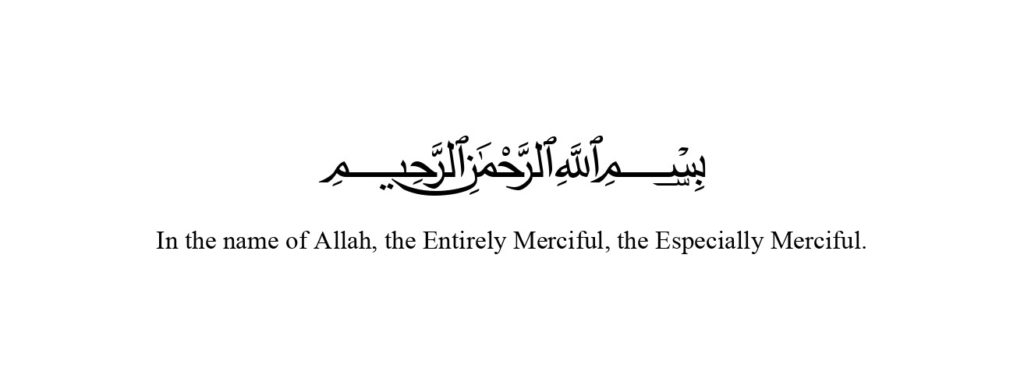
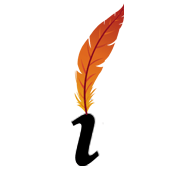
Alhamdulillah, we are grateful to release our 2021’s first issue. During a time when many Muslims around the world are battling not just the COVID-19, we are extremely thankful for the safety and opportunity to be able to work on Muslim Ink. In this issue, we bring to you a round up of relevant news from around the Muslim world, a feature on the scientific discovery of a city buried under the deserts of Arabia (which points to the miracle of the Qur’an), and articles on Islam, culture and Islamic finance. We hope you find them beneficial. We love to hear your feedback! Please let us know how we did. Jazaakumullahu khairan for subscribing!
– Muslim Ink Team
- NEWS & CURRENT AFFAIRS
- 'Muslim world needs to find place in new world order'
- First Friday Prayer in Shusha after liberation from three decades of Armenian occupation
- Muslim residents call for rebuilding mosques in India’s Hyderabad
- Bangladesh moves Rohingya refugees to remote island
- Archeologists discover ancient Muslim cemetery in Spain
- The Arab Spring ten years later
- Turkey bolsters influence across North Africa's Maghreb
- ISLAM
- "I would give up my kingdom to be like Sālim"
- The Hadith he travelled a month for
- Being humble is among the greatest forms of worship
- What you and me can do to help and comfort others
- Interesting facts about Arabic
- Book Review: Muslim women who taught their husbands
- SCIENCE
- Scientific discovery of a city buried in Rub al-Khali (Empty Quarter)
- FOOD & CULTURE
- ‘What’s the point in planting olive trees?’
- Food from 9th century Baghdad
- Mulahwajah of Caliph Harun ar-Rashid
- ISLAMIC FINANCE
- The importance of working and earning a livelihood in Islam
- IsDB approves financing of $509m projects in Uzbekistan
- Saudi Aramco finds new oil and gas fields
- Fintech institutions stress on waqf awareness in Indonesia
- PayZakat rolls out smartphone app for charity in Russia
- 2021 Will Be Year Of Economic Growth: Pakistan PM
- Videogames are a bigger industry than movies and American sports combined
NEWS & CURRENT AFFAIRS
‘Muslim world needs to find place in new world order’
World order is undergoing ‘profound realignment,’ says advisor to Turkish president
ANKARA, Turkey: The world order is undergoing a “profound realignment” and the Muslim world needs to find its place in it, said a senior advisor to the Turkish president recently.
Gulnur Aybet was recently speaking at the Governance and Political Authority in Muslim World conference hosted by the Istanbul-based Center for Islam and Global Affairs (CIGA).
Aybet said the COVID-19 pandemic is changing the global power dynamics.
“No one has a power and monopoly to design anything in the international system now,” she said.
❝
…the current global system is witnessing the “return of great power rivalry”
Aybet argued that the current global system is witnessing the “return of great power rivalry” with the rise of Russia and China that “pose an existential challenge to dominant liberal world order and those who would like to maintain it.”
However, she said, in the new order, “we see more cooperation that transcends nations and countries,” referring to efforts to manufacture coronavirus vaccines which brought together scientists and different nations.
“It is a new reality that needs to be internalized and adjusted to,” she said.
Aybet said the COVID-19 crisis also “taught us one thing – it is not necessarily the most economically or militarily powerful that can go through a crisis unscathed.”
“It is the countries that have the greatest capacity to adapt to the crisis… to adapt in international crisis and who have the most resilient societies are going to come out more powerful,” the presidential advisor added.
“There is a profound realignment going [on], and it is very important that the Muslim world finds its place in it,” she asserted.
“It is an international process… about how consensus is formed, and that consensus is formed through power relations,” said Aybet, who also teaches at Turkey’s National Defense University.
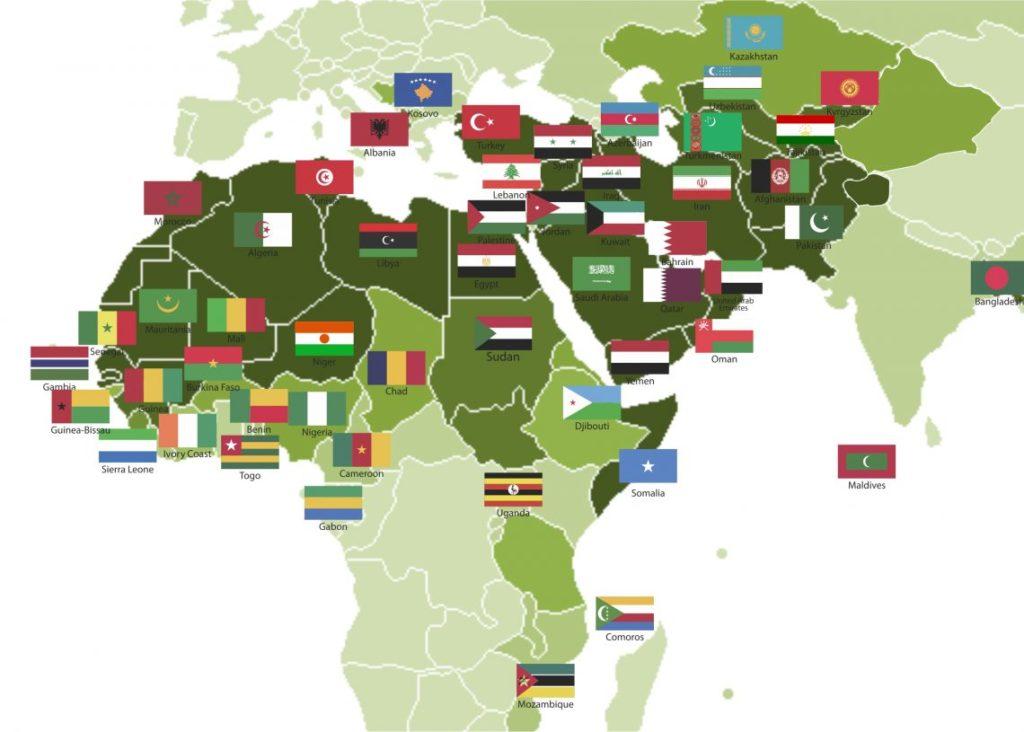
‘Western liberal order facing clash within’
According to Aybet, within the West, “there is an ideological clash between those who are trying to preserve a liberal world inherited from the 1990s and those who have an anti-globalist, anti-pluralist agenda… who unfortunately feed rightwing movements.”
“This ideological clash is not really happening in the Middle East or in Asia… it is happening in the West, in Europe, in America. This is very interesting – that the challenge to the liberal world created by the West is being challenged from within itself,” she explained.
❝
“Muslim states have a lot to contribute with their ideas about global justice…”
She said that the post-COVID-19 crisis has left the world with issues such as how to “rebuilt trust in international institutions.”
“Muslim states have a lot to contribute with their ideas about global justice… Turkey and President Recep Tayyip Erdogan has been champion of all this. Every year at the UN, he talks about global justice, needs for UN reform, and how the world is bigger than five,” she said, referring to five permanent members of the UN Security Council.
Aybet said these issues need to be “brought to the attention of Muslim world more, rather than an inward-looking reflection on good governance,” she argued, urging debate over challenges to good governance and contribution towards it.
First Friday Prayer in Shusha after liberation from three decades of Armenian occupation
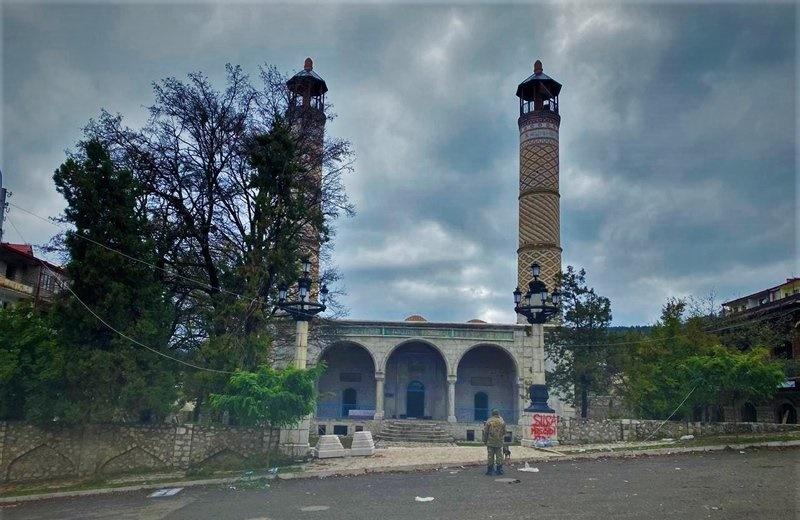
Shusha mosque
BAKU, Azerbaijan: Mosques in the Nagorno-Karabakh region’s symbolic city of Shusha called local Muslims to the weekly Friday Prayer for the first time in nearly three decades in November, 2020.
The adhan was first called out of the historical Yukhari Govhar Agha Mosque, with Azerbaijani soldiers converging on the building to perform their prayers.
Shusha, which was occupied by Armenian forces on May 8, 1992, is a strategically important city in the Upper Karabakh region, also known as Nagorno-Karabakh, an internationally recognized territory of Azerbaijan. It is located on the road to Khankendi, the region’s largest city.
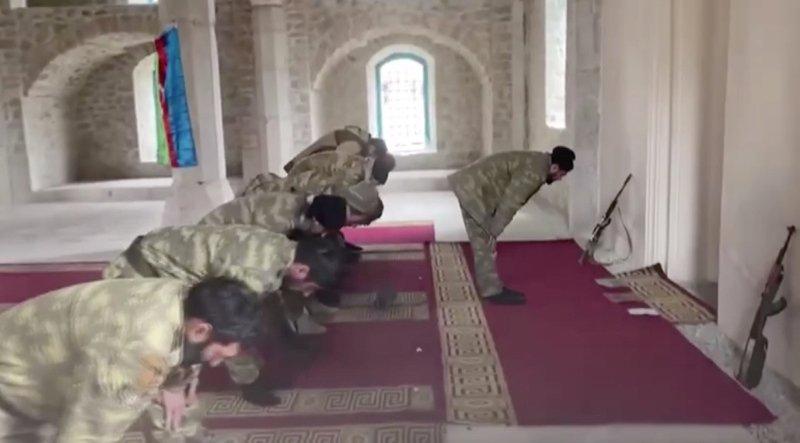
Azerbaijani President Ilham Aliyev announced on Nov. 8 that Shusha had been liberated from Armenian occupation after clashes broke out on Sept. 27.
“After 28 years, the adhan will be heard in Shusha,” said Aliyev, donning a military uniform in an address to the nation.
Baku liberated several cities and nearly 300 of its settlements and villages from Armenian occupation during this time.
On Nov. 10, the two countries signed a Russia-brokered agreement to end the fighting and work towards a comprehensive resolution.
Turkey welcomed the truce, which resulted from Baku’s military successes against Yerevan.
Muslim residents call for rebuilding mosques in India’s Hyderabad
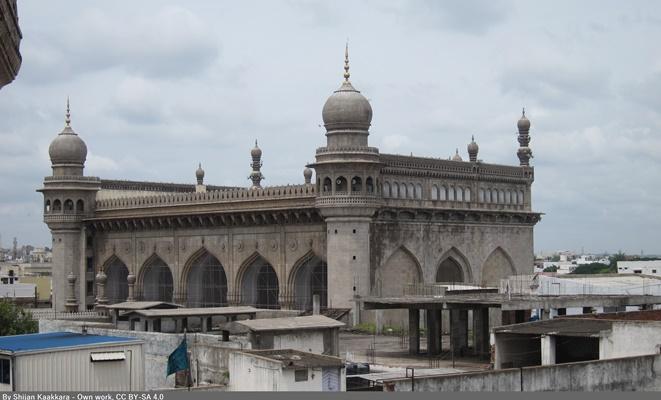
Makkah Masjid
HYDERABAD, India: Muslim groups and many Old City residents called on people to help rebuild mosques and spread brotherhood in the city. “We want to give a message to our youths to rehabilitate mosques by establishing prayers. It’s time we took care of our historic structures,” said Asif Alam, a trader in Begum Bazaar, according to a report in the Times of India.
Many mosques in the Old City and across Hyderabad need attention and people said there was a need to care for them. There are many mosques requiring attention and public representatives should take up the matter to construct all of them,” said Syed Iftekar Hussaini, a member of the Association of Save Waqf Properties (ASWP). “It hurts every Muslim in the city of Hyderabad.”
Bangladesh moves Rohingya refugees to remote island
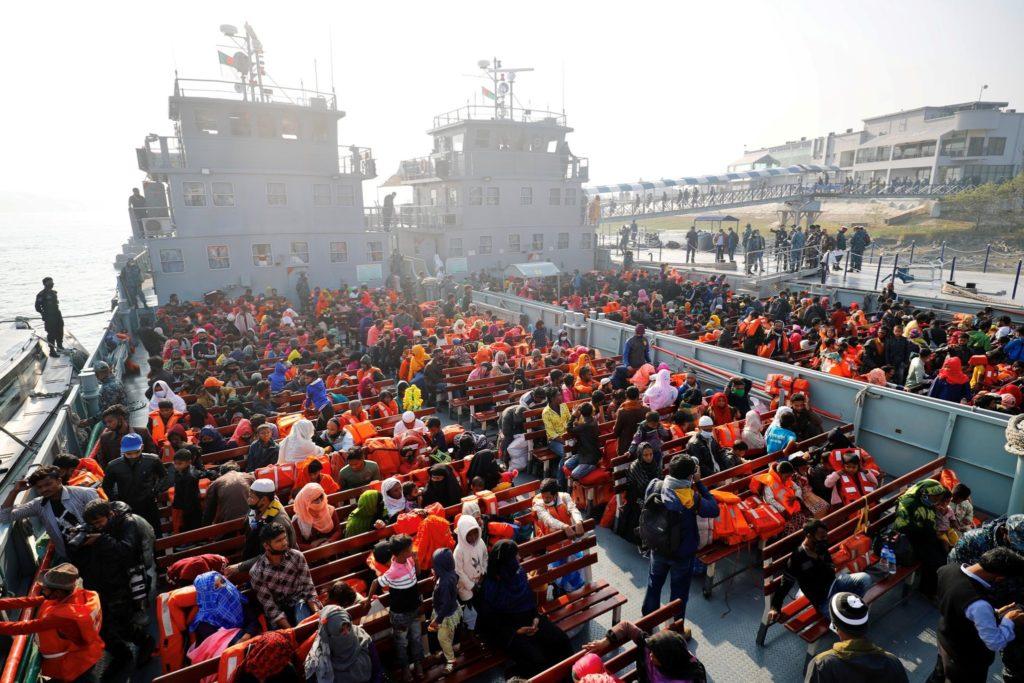
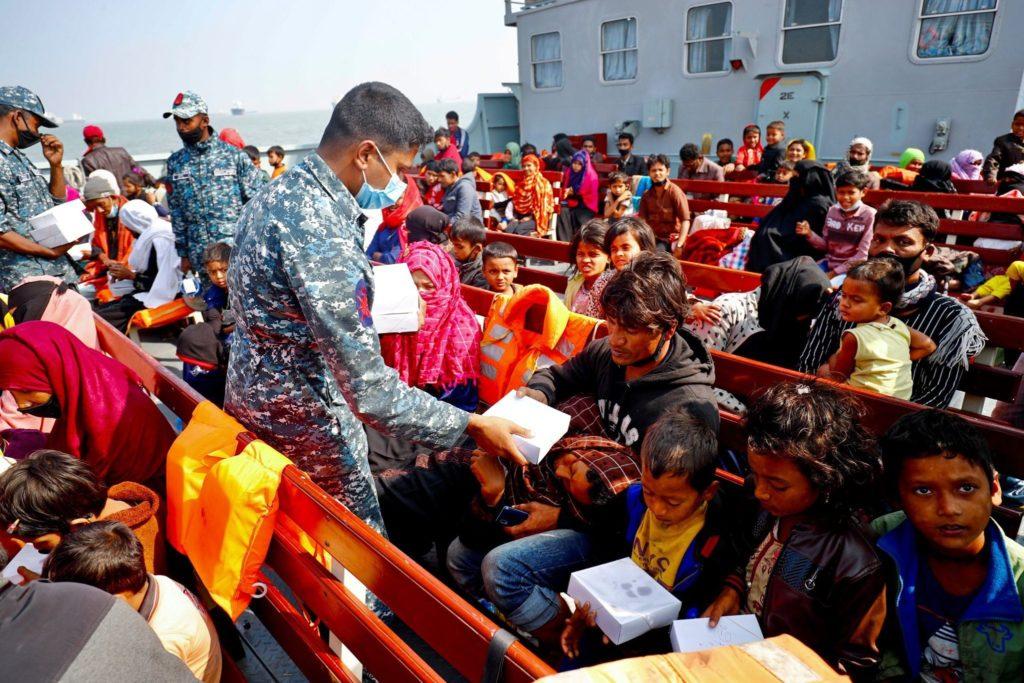
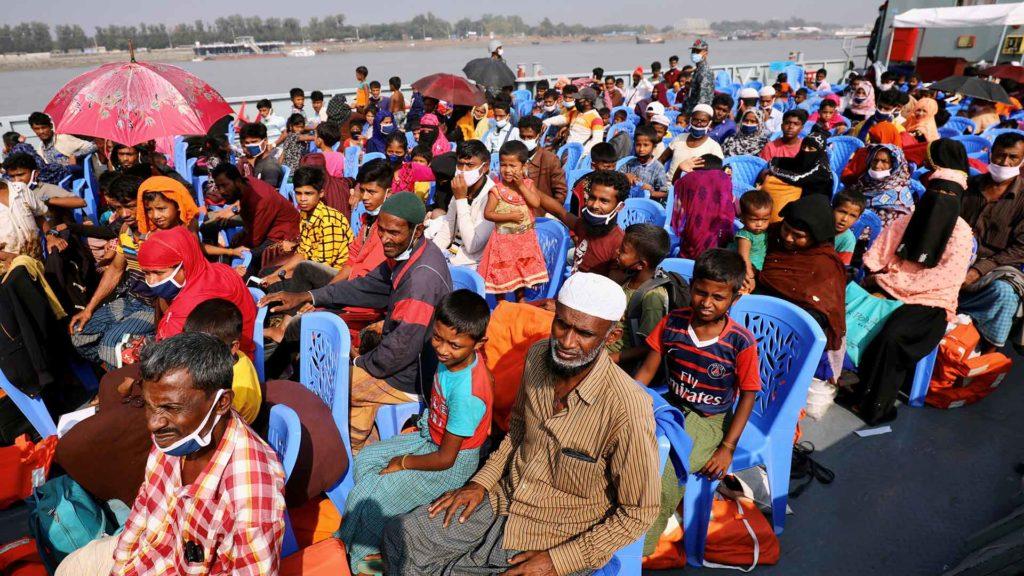
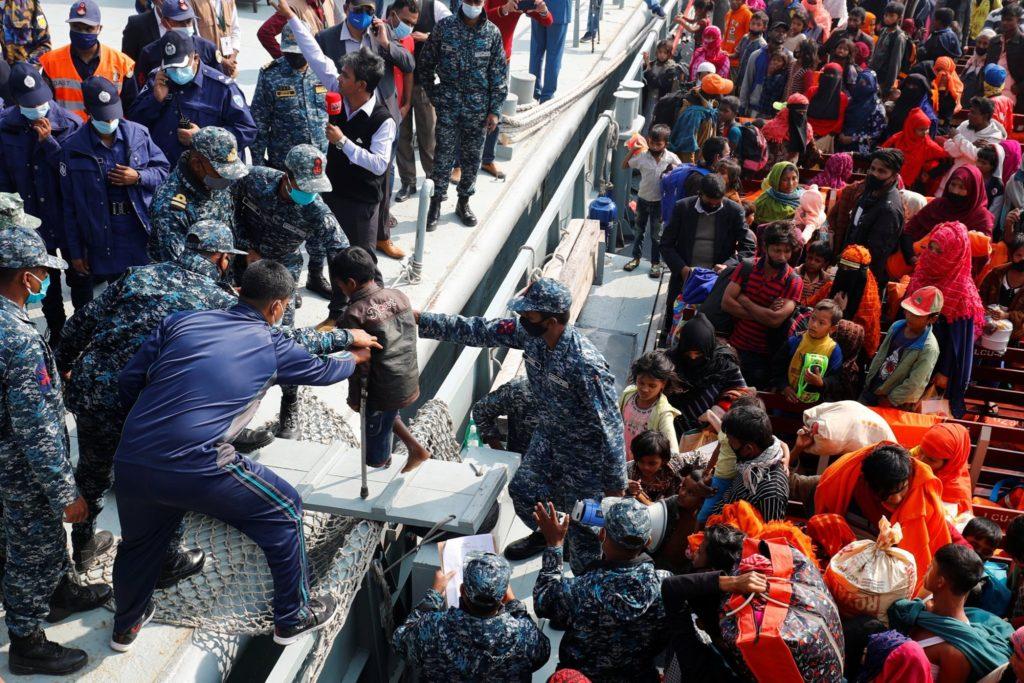
Bangladesh has moved two groups of Rohingya Muslim refugees to a low-lying island in the Bay of Bengal last month.
The United Nations says it has not been involved in the relocation but urged the government to ensure no refugee is forced to move to Bhasan Char island, which only emerged from the sea 20 years ago.
“We are ready to receive the new arrivals,” Navy Commodore Abdullah Al-Mamun Chowdhury said from the island about the 1,804 Rohingya being moved in seven ships.
A first group of more than 1,600 Rohingya, members of a minority group who fled Myanmar, was relocated from their rickety camps near the Myanmar border to Bhasan Char earlier in December, 2020.
Storms regularly hit the Bangladesh coast. In 1991, nearly 143,000 people were killed when a cyclone whipped up a 4.5-metre tidal surge.
The government also says the relocation is voluntary but some refugees from the first group have spoken about being coerced to go.
The government has built a 12-kilometre embankment to protect the island along with housing for 100,000 people. It dismisses the risks.
“The island is completely safe,” Foreign Minister Abdul Momen told Reuters.
The government also says the relocation is voluntary but some refugees from the first group have spoken about being coerced to go.
Two Rohingya men on board one of the ships heading to the island from the port of Chittagong told Reuters they were moving to their new home voluntarily. One said he was joining relatives already there while the other was moving with his wife and six children.
“There is so much suffering and conflict in the camp,” said one of the men. “We are going there in the hope of a better life.”
The island was once regularly submerged by monsoon rains. But it now has flood protection embankments, houses, hospitals and mosques built at a cost of more than $112 million by the Bangladesh navy. Located 34 kilometres from the mainland, the island surfaced only 20 years ago and was never inhabited.

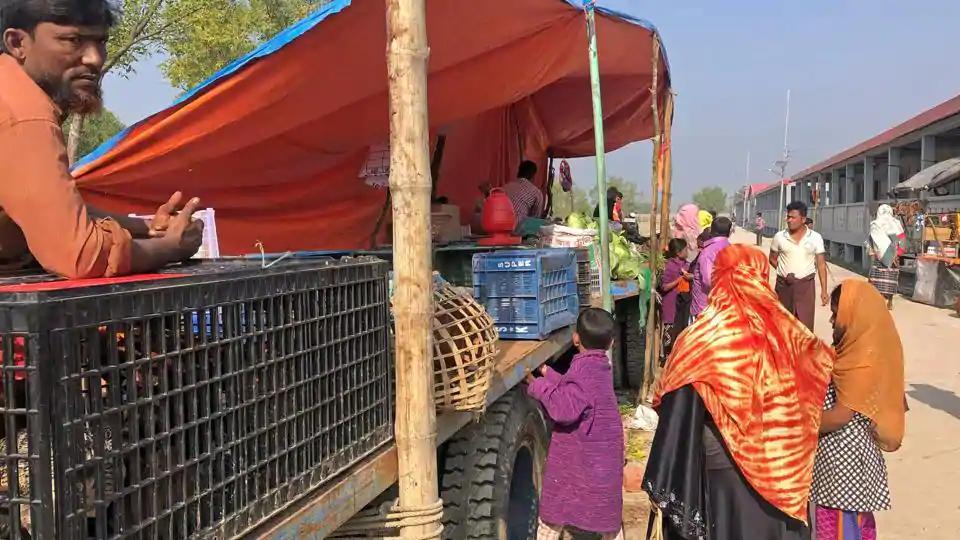
Left: A view of the tin shed concrete houses at the Bhasan Char island in Noakhali district, Bangladesh, December 29. REUTERS/Mohammad Ponir Hossain. Right: Standing next to stalls selling vegetables. – AFP
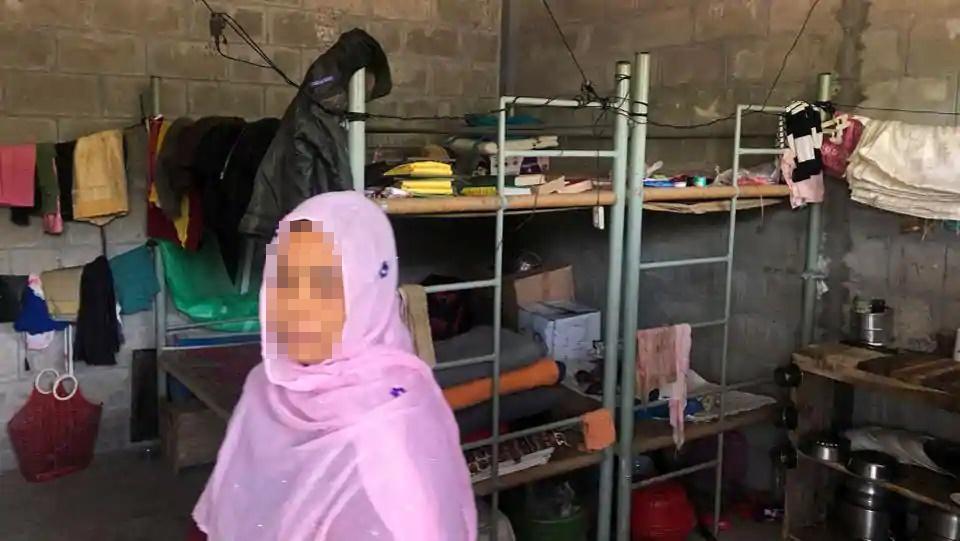
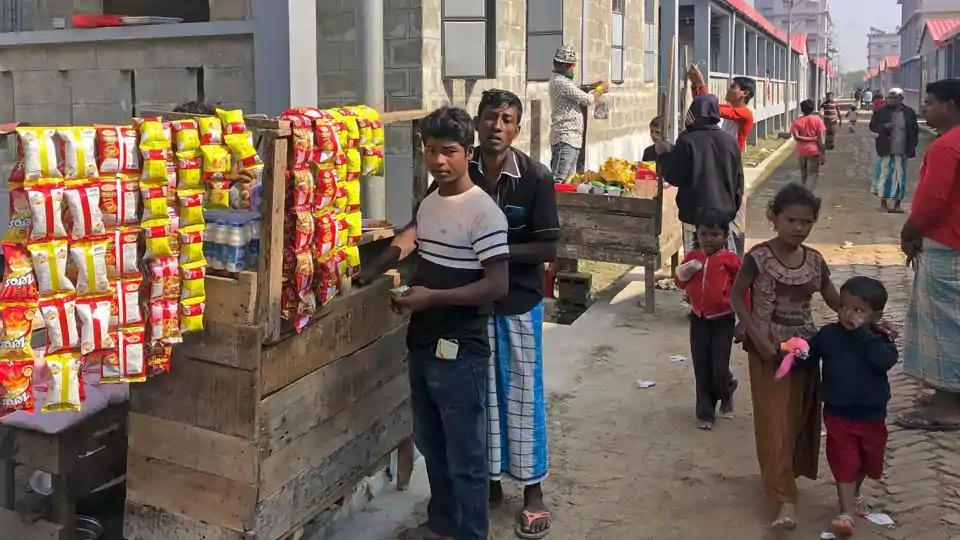
Left: A view of a room with beds inside the tin shed concrete house at the Bhasan Char island in Noakhali district, Bangladesh, December 29. REUTERS/Mohammad Ponir Hossain. Right: Outside their accommodation. – AFP
The island’s facilities are built to accommodate 100,000 people, just a fraction of the million Rohingya Muslims who have fled waves of violent persecution in their native Myanmar and are currently living in crowded, squalid refugee camps in Cox’s Bazar district.
About 700,000 Rohingya fled to the camps in Cox’s Bazar after August 2017, when the military in Buddhist-majority Myanmar began a harsh crackdown on the Muslim group following an attack by insurgents. The crackdown included rapes, killings and the torching of thousands of homes, and was termed ethnic cleansing by global rights groups and the UN.
Archeologists discover ancient Muslim cemetery in Spain
THE TOWN’S CHURCH WAS ONCE A MOSQUE
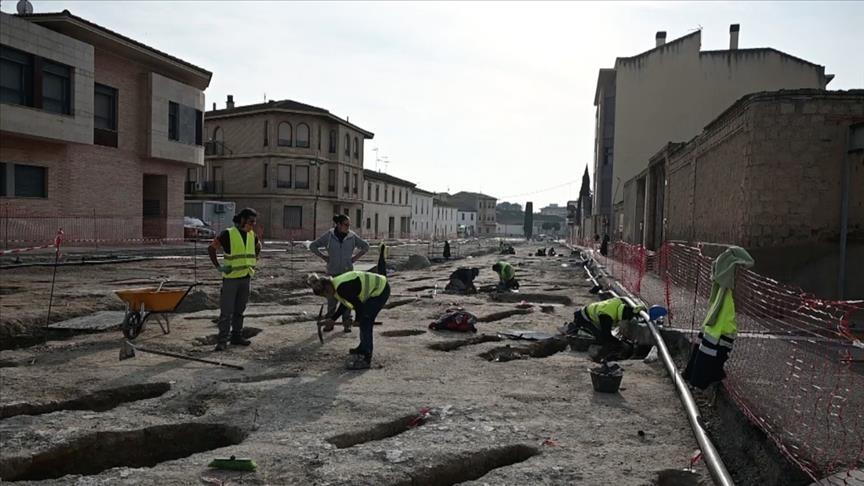
Some 400 graves have been unearthed in Tauste town, near Zaragoza city, up from 40 in 2012-13, archeologists said. The figure could climb to 4,500 should the excavations continue, they added.
Speaking to Anadolu Agency, Javier Nunez Arce, head of Elpatiaz Cultural Association, said they knew there used to be a cemetery in the town but did not know its origins.
“..it is clear that a Muslim community with a mosque used to live in this town,”
Noting that excavations started in 2010, he said it immediately became clear that the graves belonged to Muslims as the skeletons were facing toward Makkah, in line with Islamic traditions.
Arce also said they found out that the bell tower of the Catholic church in town was converted from a minaret.
“Therefore, it is clear that a Muslim community with a mosque used to live in this town,” he added.
The Arab Spring ten years later
All news articles, and this one in particular written by a former Israeli foreign minister, are being shared for information purposes only. We do not necessarily support their views.
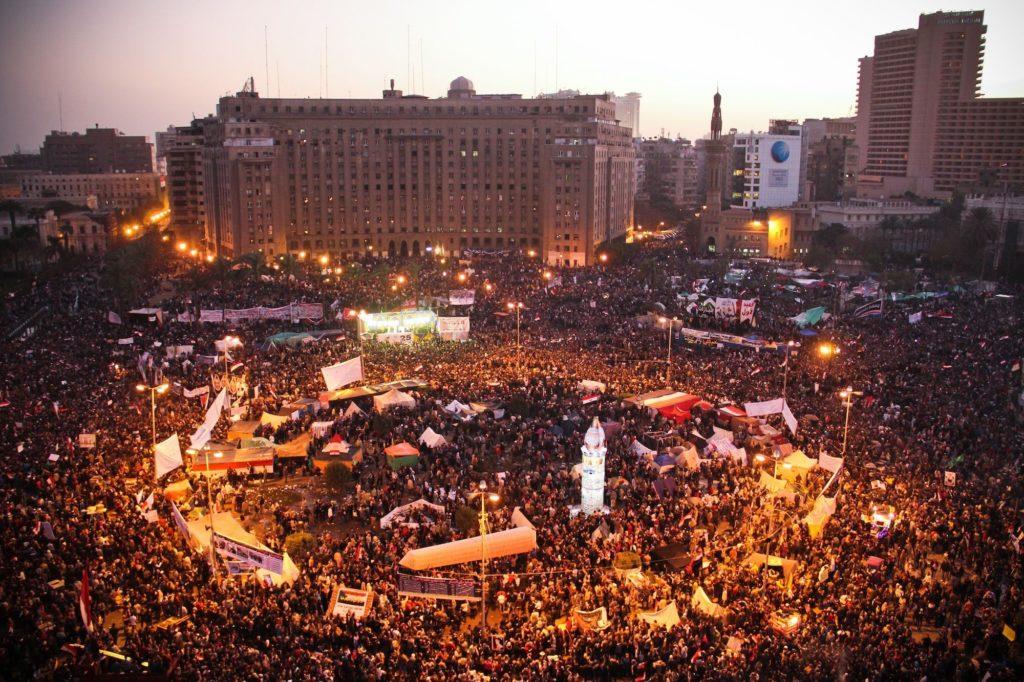
TEL AVIV: When the struggling street vendor Mohamed Bouazizi set himself alight in Sidi Bouzid, Tunisia, on December 17, 2010, he could not possibly have imagined how consequential his desperate protest would be. By sparking a wave of civil unrest across the Arab world, he touched off the region’s most profound transformation since decolonization.
First, Tunisia’s Jasmine Revolution erupted, leading to the ouster of the country’s longtime president, Zine El Abidine Ben Ali. Protests quickly engulfed other Arab countries, and more autocrats – namely, Egypt’s Hosni Mubarak, Libya’s Muammar el-Qaddafi, and Yemen’s Ali Abdullah Saleh – were toppled.
Most of those who managed to overthrow their autocrats in the so-called Arab Spring didn’t see their democratic hopes blossom.
In Syria, President Bashar al-Assad managed to hold onto power – at the cost of plunging his country into a brutal civil war that has killed more than a half-million people, forced millions to flee the country, and left millions more internally displaced. The conflict returned Syria to the Russian fold, and turned its territory into an Iranian-Israeli battlefield.
Most of those who managed to overthrow their autocrats in the so-called Arab Spring didn’t see their democratic hopes blossom. Yemen’s “Coffee Revolution” quickly evolved into a civil war between the central government and the Iran-backed Houthi rebels. Though Saleh eventually resigned, the Yemeni people got no relief. On the contrary, Saudi Arabia led a brutal intervention against the Houthis, turning Yemen into the site of a savage proxy war with Iran. The result has been the world’s worst humanitarian catastrophe.
As for Libya – already an artificial colonial creation – its regime change, brought about by Western humanitarian intervention, was chaotic. Since 2011, the country has been subsequently torn apart by fighting among forces backed by a variety of external actors, including Egypt, Russia, Turkey, and the United Arab Emirates, as well as renegade generals and local warlords.
The dominos continued to fall for years, with Algeria’s Hirak Movement erupting in February 2019 – six days after Abdelaziz Bouteflika announced his candidacy for a fifth presidential term. The protests drove Bouteflika to resign, and resulted in a large-scale boycott of the presidential election in December 2019. The winner of that election, Abdelmadjid Tebboune, is merely a new civilian face for seemingly eternal military rule.
The Arab Spring exposed the innate fragility of many of the affected states.
The Arab Spring exposed the innate fragility of many of the affected states. While some leaders managed to hold onto power, and some repressive military apparatuses remain robust, weak legitimacy, often based on rigged elections, leave them highly vulnerable, especially in the face of tribalist and Islamist sentiment. (It is no coincidence that the Arab monarchies – Morocco, Jordan, and Saudi Arabia – which derive their legitimacy largely from religious sources, fared much better than the pseudo-presidential republics.)
By exposing state weakness, the Arab Spring opened the way for the rise of the Islamic State, a Sunni terrorist group, in parts of Syria, Iraq, and the Sinai Peninsula where central governments had no control. Though local and international forces eventually dismantled ISIS’s “caliphate,” the group still has affiliates in Egypt, Syria, and Libya. As long as the problem of state weakness goes unaddressed, Sunni warlords will continue to emerge.
People seem to be pinning their electoral hopes on political Islam, which has emerged as the main alternative to secular autocracy over the last decade. Wherever free elections took place, Islamist parties won power. Tunisia’s moderate Ennahda party, for example, was integral to making the country the Arab Spring’s only true success story, with all three elections since 2011 having led to peaceful transfers of power.
In Egypt, the Muslim Brotherhood’s Mohamed Morsi won the presidency in 2012. But, after just over a year in power, the military, led by Field Marshal Abdel Fattah el-Sisi, ousted him and installed a regime even more repressive than Mubarak.
In his recently published memoir, Barack Obama confessed that if he were a young Egyptian, he would have joined the protesters in Cairo’s Tahrir Square in 2011.
No story of the Middle East’s recent transformation can be complete without the United States. In his recently published memoir, Barack Obama confessed that if he were a young Egyptian, he would have joined the protesters in Cairo’s Tahrir Square in 2011. Instead, as US president, he sacrificed America’s two closest regional allies, Mubarak and Ben Ali, opening the way for a redrawing of the Middle East’s strategic map.
As Mohammed bin Zayed, Crown Prince of the Emirate of Abu Dhabi and Deputy Supreme Commander of the UAE Armed Forces, made clear to Obama, allowing Mubarak’s ouster and accepting Morsi’s electoral victory gave the impression that the US was not a reliable long-term partner. Compounding this sense of betrayal among America’s Arab partners, Obama subsequently negotiated the Joint Comprehensive Plan of Action (JCPOA) with Iran, and rebalanced US strategic priorities toward Asia, thereby opening the way for Russia to expand its influence in the Middle East.
Non-Arab regional powers – Iran, Turkey, and Israel – have also been quick to capitalize on Arab woes. While America was busy fighting ISIS, Iran helped rescue the embattled Syrian regime and deployed its own forces along Israel’s borders. Its reach now extends from Syria and Iraq to the shores of the Mediterranean in Lebanon.
As 2021 begins, the geopolitical terrain in the Arab world will continue to shift.
Meanwhile, Turkey has become the dominant force in Northern Syria, where it claims to be preventing an autonomous Kurdish state from emerging on its doorstep, and has consolidated its military presence in Qatar. Even the influx of Syrian refugees to Turkey has become a powerful bargaining chip for President Recep Tayyip Erdogan, who has threatened to send millions to Europe if its leaders criticize his […] practices.
But perhaps the most shocking outcome of recent upheaval in the Arab world relates to Israel. Viewing the country as a necessary power broker in America, and now a reliable ally in the fight against Iran, a number of Arab states – Bahrain, the UAE, Morocco, and Sudan – have normalized bilateral relations. Once Saudi Arabia follows suit, the Arab-Israeli conflict will effectively end, even though the Palestinian question remains unresolved. This is a dramatic paradigm change in Middle East politics.
As 2021 begins, the geopolitical terrain in the Arab world will continue to shift. The outcome will depend on a number of factors, not least whether – or when – the goal of democracy mobilizes Arab populations once again.
Shlomo Ben-Ami, a former Israeli foreign minister, is Vice President of the Toledo International Center for Peace. He is the author of Scars of War, Wounds of Peace: The Israeli-Arab Tragedy.
Turkey bolsters influence across North Africa’s Maghreb
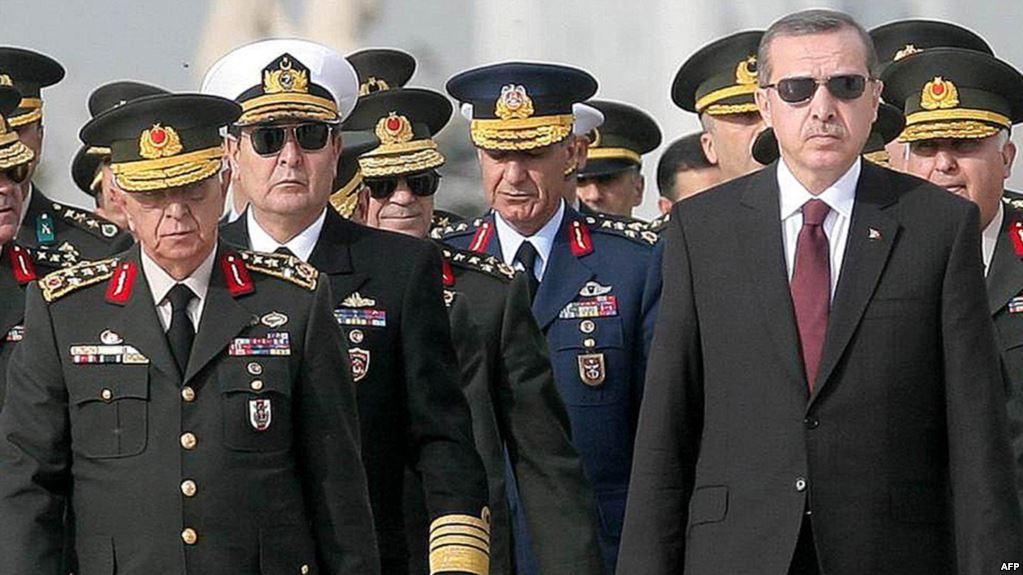
Turkey is boosting its influence across North Africa, analysts say, intervening militarily in war-torn Libya and using “soft power,” trade and investment in Tunisia, Algeria and Morocco.
While Turkish-made drones have won battles in Libya, its TV serials and other cultural products have won hearts and minds in Maghreb countries, several of which were once part of the Ottoman Empire.
His willingness to confront European former colonial powers, especially France, and present himself as a defender of the Muslim world has earned him the respect of many in North Africa and elsewhere, say observers.
Muslim President Recep Tayyip Erdogan has in recent years asserted Ankara’s role as a regional player, sparring with Greece and the European Union as well as with Russia and Gulf nations.
His willingness to confront European former colonial powers, especially France, and present himself as a defender of the Muslim world has earned him the respect of many in North Africa and elsewhere, say observers.
Political analyst Ali Bakeer, based in Ankara, said that “Turkey is seeking to strengthen its relations with the countries of the Maghreb region.”
“Turkish-Algerian relations are emerging fast. Meanwhile mutual interests between Turkey and Libya are evolving day by day. When it comes to Tunisia and Morocco, Turkey is trying to focus on the mutual economic benefits.”
Hard power in Libya
Turkey’s impact has been most dramatic in oil-rich Libya, which was thrown into chaos after a 2011 NATO-backed uprising toppled and led to the killing of long-time dictator Muammar Gaddafi.
Ankara’s help with military advisers, equipment and soldiers — echoing its interventions and defense support from Syria to Azerbaijan — proved decisive this year when it rescued the UN-recognized Government of National Accord.
Its military footprint is now significant in Libya, a country seeking a permanent peace following a UN-brokered ceasefire.
Turkey helped the Tripoli-based GNA push back an offensive by forces loyal to eastern-based strongman Khalifa Haftar, who is backed by Egypt, the United Arab Emirates and Russia.
This also helped Turkey on a separate issue, a contest with Greece and Cyprus for offshore gas deposits, after Ankara signed a deal with the GNA laying claim to vast maritime territories.
Its military footprint is now significant in Libya, a country seeking a permanent peace following a UN-brokered ceasefire.
Tunisia, Algeria, Morocco
In the countries west of Libya, Turkey’s focus has been on trade and investment.
More than 1,200 Turkish companies have set up shop in Algeria, a country Erdogan visited early this year and also helped with Covid-19 medical supplies.
Turkey has become the third largest importer of Algerian products, and the two countries aim to boost trade to 4.1 billion euros ($5 billion) a year.
In other outreach, Turkey helped in recent years with the restoration of the Ottoman-era Ketchaoua Mosque in Algiers.
Turkish imports to the Maghreb region have risen sharply, especially “Made in Turkey” textiles.
In Tunisia, businesses have been hit by low-cost Turkish products which have increased since a 2004 free trade deal, but Tunis in 2018 reimposed some import duties.
There is, however, another source of appeal to many in the region — Erdogan himself.
Amid North Africa’s bulging youth population, struggling with soaring unemployment worsened by the pandemic, Erdogan has won wide respect.
A whole section of the youth sees in the Turkish example a model of independence.
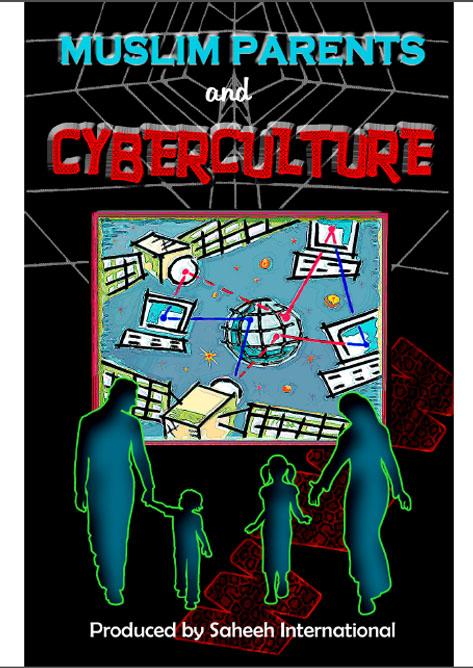
Muslim Parents And Cyberculture
By Umm Muhammed
This book presents practical guidelines compatible with Islamic principles to help them avoid serious problems while allowing them the many benefits of internet use.
ISLAM
“I would give up my kingdom to be like Sālim“
By Ibn Kathir (d. 774H/1373CE)
Translated by Rasheed ibn Estes Barbee
The Umayyad Caliph Hisham bin Abdul Malik performed Hajj. While he was performing Tawaf around the house he saw Sālim ibn Abdullah ibn Umar ibn al-Khattab.
Sālim was carrying his broken shoes in his hand and he was wearing a garment that was not worth two Dirham (the currency of that time).
The Caliph Hishām went close to him and said, “O Sālim do you need anything?”
Sālim looked at him surprised and angry. Then he said to him, “Are you not embarrassed, while we are in the house of Allah, you want me to ask other than Allah for my needs?”
Severe embarrassment and shame appeared on the face of Hishām, so he left Sālim alone and completed his Tawaf, but he continued to watch him.
When he saw Sālim outside of Masjid Harām, he caught up to him and said, “O Sālim you refused to tell me what you needed inside of Masjid Harām, so ask me now since you are outside of the Masjid.”
Sālim said to him, “Should I ask you for my worldly need or my needs in the hereafter?” The Caliph said to him, “O Sālim, ask me for your worldly needs, as for needs in the hereafter, you only ask Allah for this.”
Sālim said, “O Hishām, I swear by Allah, I have not asked for any worldly needs from the One who owns the world, so how could I ask of someone who does not own it?!”
The Caliph Hishām’s eyes filled with tears and he said this famous statement, “I would give my entire kingdom to be like Sālim.”
Al-Bidaya wa’l-Nihaya (9/235)
The Hadith he travelled a month for
By Rasheed ibn Estes Barbee
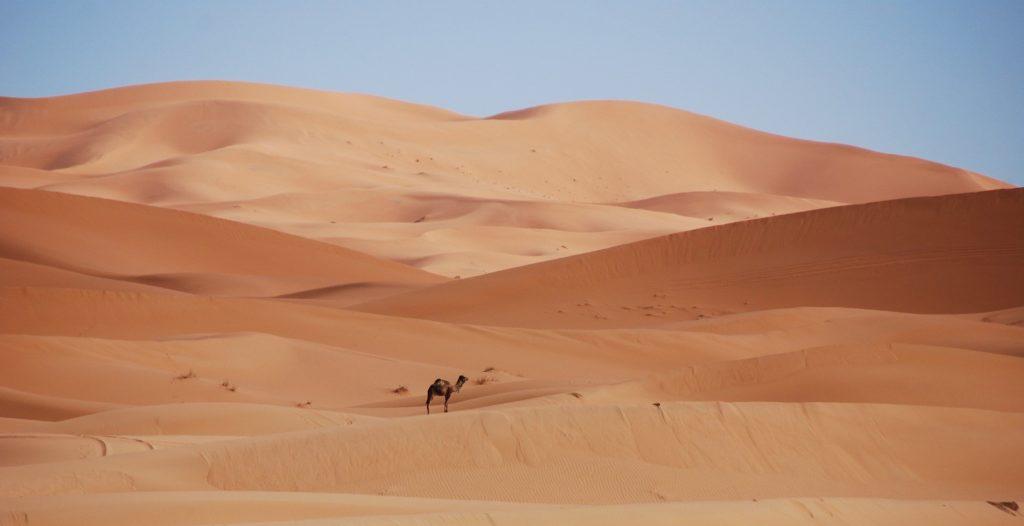
We often hear how the pious predecessors would travel long distances just to hear one Hadith. But who were those travelers? What were those Hadith?
Traveler: He is the noble companion Jābir ibn Abdullah ibn Amr ibn Harām. He narrated 1,540 Hadith. He fought in 19 battles alongside the Messenger of Allah ﷺ. His father was a companion. His seven sisters were all companions.
Narrator: He is the noble companion Abdullah ibn Unays. He prayed towards both Qiblas. He smashed the idols of Bani Salamah.
The Hadith as narrated by Jābir ibn Abdullah.
It reached me that a man heard a Hadith from the Messenger of Allah ﷺ, so I purchased a camel, then traveled quickly to him. I travelled for one month until I reached Sham.
The man was Abdullah ibn Unays. I said to the doorman, tell him Jābir is at the door. He replied, “Ibn Abdullah?” I said, “Yes.” He came out dragging his thobe. He hugged me and I hugged him.
I said to him, “It has reached me that there is a Hadith which you heard from the Messenger of Allah ﷺ concerning the retribution. I was afraid that you might die, or I might die before I heard it.”
Abdullah ibn Unays said, “I heard the Messenger of Allah ﷺ, ‘The people will be gathered on the Day of Standing—and he pointed with his hand towards Sham. They will be gathered naked, uncircumcised, and buhman.’ We said, ‘And what is buhman?’ He ﷺ replied, ‘They will not have anything with them. Then a Caller will call out with a voice heard equally by those far and near (saying), ‘I am the King, I am the Reckoner. It is not befitting that anyone from the inhabitants of the Hellfire should enter the Hellfire while someone from the inhabitants of Paradise owes him a right, until he settles it. And it is not befitting that anyone from the inhabitants of Paradise enters Paradise while someone from the inhabitants of the Hellfire owes him a right, until he settles it, even if it is only a slap.’’ We said, ‘And how will this be, when we will stand before Allah, naked, uncircumcised, without anything?’ He ﷺ replied, ‘With good deeds and bad deeds.’” (Al-Adab Al-Mufrad, #970, declared Hasan by al-Albani)
Compensating the Muslim
The Prophet ﷺ said, “Whoever has wronged his brother, should ask for his pardon (before his death), because in the Hereafter there will be neither a dinar nor a dirham (any currency). He should secure pardon in this life before some of his good deeds are taken and paid to his brother, or if he has no good deeds, some of the bad deeds of his brother will be taken and flung on him in the Hereafter.” (Al-Adab Al-Mufrad, #970)
Compensating the Non-Muslim
Ibn Abidin said, “A Muslim who forcefully takes the wealth of a non-Muslim or steals from him will be punished on the Day of Judgement. This is because he has taken wealth which is protected. And it is not likely the non-Muslim will grant a pardon to the Muslim, in contrast to the pardon which is hoped from the Muslim for another Muslim. Therefore, the disputes to be settled with the non-Muslim on the Day of Judgment are more severe. And during the settlement for the oppression; the Muslim cannot give the disbeliever his good deeds, because the disbeliever is not able to receive good deeds on the Day of Judgement. And the Muslim cannot receive the kufr of the disbeliever, thus the retribution remains.”
Compensating Animals
Ibn Hajar al-Haytami said, “There will be retribution amongst animals; and retribution between humans and animals as well. The person who unjustly hit an animal, starved an animal, refused to give it drink, or overburdened it beyond its capability, this animal will extract retribution from this human according to how much it was oppressed. The proof is the hadith of the cat. The Prophet ﷺ saw a woman confined in the Hellfire while a cat was clawing her face and chest; punishing her as she punished it in this life by imprisoning it and starving it. And this applies to all animals.”
Compiled and translated by Rasheed ibn Estes Barbee
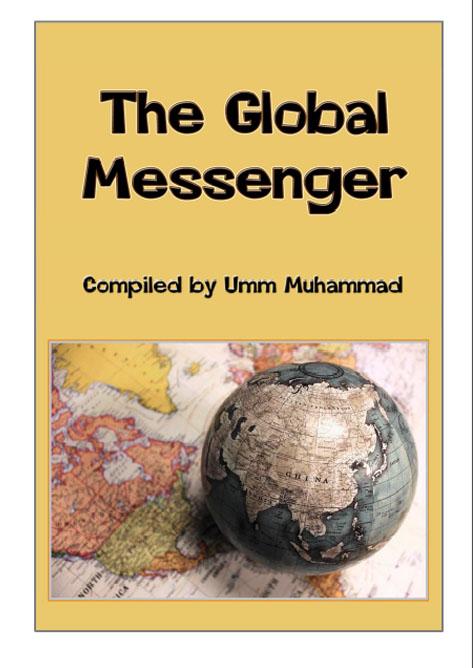
The Global Messenger
By Umm Muhammed
This is an introduction to Muhammad ﷺ, the Prophet of Islam, with a glimpse of his life, character, accomplishments and teachings – a brief account presenting facts from historically verified sources.
Being humble is among the greatest forms of worship
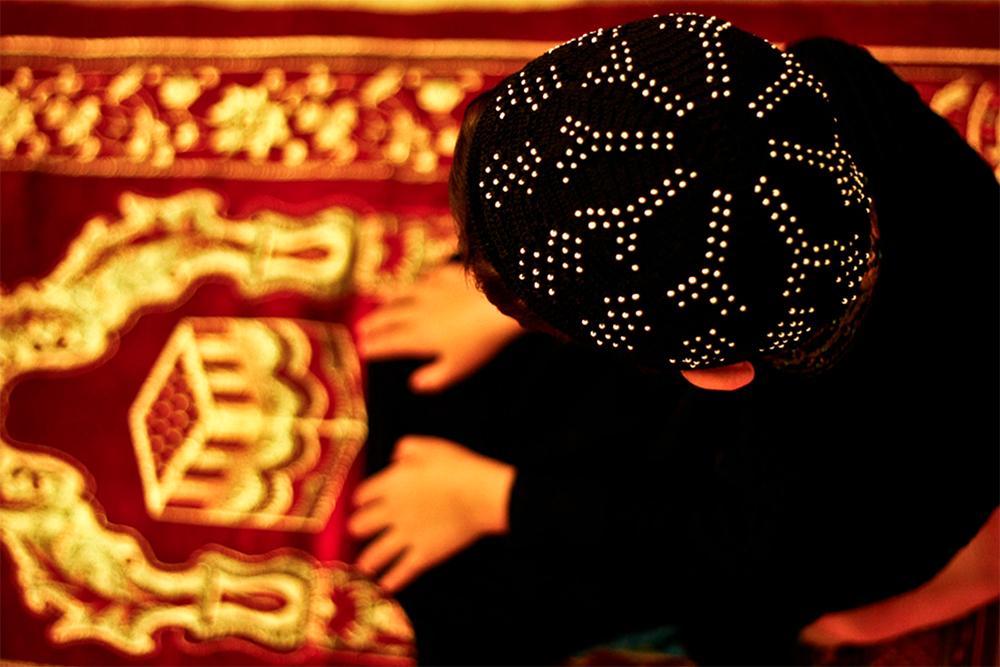
“You are neglectful of the greatest worship: being humble,” said our mother Aisha, may Allah be pleased with her. (Az-Zuhd, 1/132)
She knew the great importance of this characteristic very well from the Prophet ﷺ who said: “Allah revealed to me that [we must] be humble, so that a person does not see himself better than others, and so that no one oppresses anyone else.” (As-Silsilah as-Sahihah, #570)
Ali ibn Abi Talib, may Allah be pleased with him, said: “Good is not to have a lot of wealth or children. Good is to increase in your knowledge and forbearance and to not show off to people in your worship. If you do good, you thank Allah the Most High. If you do wrong, you seek Allah the Most High’s forgiveness.” (Al-Hilya, 1/75)
Ibrahim ibn Shaibaan (d. 337 AH), may Allah have mercy on him, said: “Honor is in being humble, greatness is in having taqwa, and freedom is in being content [with what you have].” (Madarij as-Salikeen)
And al-Hasan al-Basri said: “Do you know what being humble means? It means that you leave your house and do not come across another Muslim except that you feel that he is better than you [in some way].” (At-Tawadu’ wal Khumool)
What you and me can do to help and comfort others
By Rahla Khan
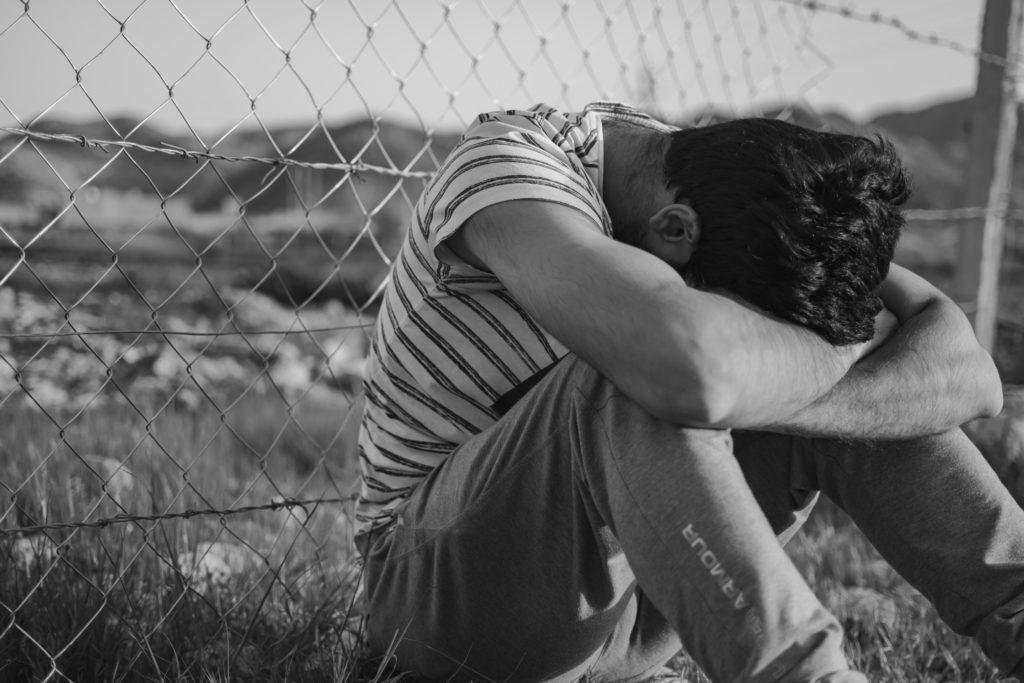
Imagine that you were witness to a gory hit-and-run accident: from your vantage point you can actually see the helpless, wounded victims, hear their groans of pain and their cries for help.
What would you do?
If you were a doctor or health-care worker, you would attempt to rescue, resuscitate and revive the victims. If you weren’t qualified/equipped to help them yourself, you would try and flag down other cars and get other people to help and carry the victims to the nearest hospital. At the very least, you would call an ambulance or emergency services so that they could be helped.
Only an individual with an exceptionally hardened heart would survey the scene and decide: “It’s not my problem,” avert his eyes and go away without trying to help in some way.
In my mind, this somewhat grisly analogy is apt for the state of our Ummah, and our inexcusable apathy towards it.
It’s almost as if we, the regular, average, and ordinary Muslims have abdicated our responsibility and conveniently look towards the scholars, students of knowledge, the rich and influential to do their bit – and hope it makes up for our reluctance/indifference.
Interestingly, our collective inertia is indicative of the state of our faith.
Ibn al-Qayyim’s Advice on How to Support Others
Ibn Al-Qayyim Al-Jawziyyah (may Allah have mercy upon him) says in his book al-Fawa’id:
“There are different ways of supporting a fellow believer: with one’s wealth, with one’s position of authority or power, by means of physical service, by offering sincere advice and guidance, by du’aa and asking for forgiveness for them, and by feeling their pain.
“The level of one’s support will be affected by the level of one’s faith. The weaker a person’s faith, the weaker his support will be; the stronger the faith, the stronger the support. The Messenger of Allah ﷺ was the greatest of all people in his support for his companions, so the more closely his followers follow him, the greater will be their support for their fellow-believers.”
To the sincere doer of good, every act of kindness – ranging from the big things to al-ma’oon (the smallest good deeds, that could consist of supplying ordinary provisions like sugar, salt and water to the needy) – is fuel in the race towards forgiveness from the Lord, and towards Paradise.
Example of Abu Bakr and Umar
There’s the famous story of Abu Bakr and Umar (may Allah be pleased with them) which illustrates this best:
“During the days of the Caliphate of Abu Bakr, in an out of the way street in Madinah, there lived a blind old woman. Umar would go to her house everyday to see if she required help, but he always found that someone else had anticipated his visit and supplied all the needs of the old lady. One day Umar went to the house of the lady earlier than usual and found that the man who visited the old lady every morning and served her, was none other than Abu Bakr.
Before becoming the Caliph, Abu Bakr used to milk the goats in the neighborhood, and when he became the Caliph, he passed by some women in the street, one of whom remarked that now that he had become the Caliph he would no longer milk the goats for them. Abu Bakr heard these remarks and said that the caliphate made no difference to him, and that he would continue to milk their goats.”
Modern-day Examples
I have seen numerous people in Saudi Arabia who seem to have inherited the same spirit of service: There was an unknown brother who visited my husband in hospital when he had his hand operated upon, fed him lunch and tucked him in comfortably, made du’aa for his speedy recovery and left – without divulging his name. When my husband inquired after him, he was told that he was a regular visitor on weekends and just came around to help the patients.
I know a sister who used to make small packets of detergent powder to distribute to the pilgrims during Hajj. She said she had never thought that a small gesture like this would be welcomed by them, but was pleasantly surprised when her little gift was appreciated and accepted gratefully.
It just goes to show that we are limited in our capacity to do good to our fellow Muslims only by our lack of imagination and will – not by a lack of material means.
CHECK OUT OUR BOOKSTORE

Interesting facts about Arabic
By Bushra Wangde
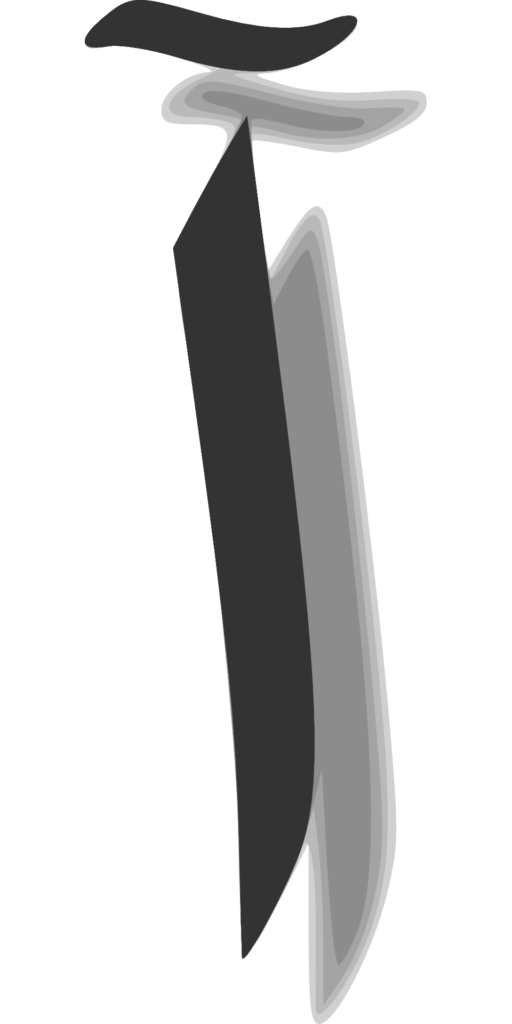
- Arabic script is the third most widely used script in the world, after the Latin and Chinese scripts.
- Arabic language is actually abjad, meaning they are not alphabets, rather all the letters of Arabic are consonants (letters that produce sound). They are non vowel letters.
- Arabic is an ancient Semitic language believed to be over 2000 years old!
- Arabic is a rich language. The Arabs have over 1000 words just for describing the camel, and over 60 different words for love! The amazing part is that every word has its own shade of meaning. Two words may be similar but they both will have slightly different implications in meaning.
- Arabic is extremely concise. A sentence of three words in English can be said in just five letters in Arabic. For e.g., “He gave him” is أعطاه in Arabic.
- Arabic is spoken in 25 countries. Predominantly among the native speakers in the Middle East and North Africa.
- Arabic builds words from basic roots. For any given word, it can be broken down to mainly three root letters. Different words, with the same root letters, will play around the same meanings. For example; the word كتاب, meaning ‘book,’ comes from the root letters ك-ت-ب, meaning ‘to write.’ Many more words come from the same root letters like كاتب (writer), مكتبة (bookstore/library) or كتابة (essay). Hope you get the idea.
- Arabic has many dialects. Despite being the same language, it is spoken by people in different regions in completely different ways to the point that a person from one region may not be able to understand the other!
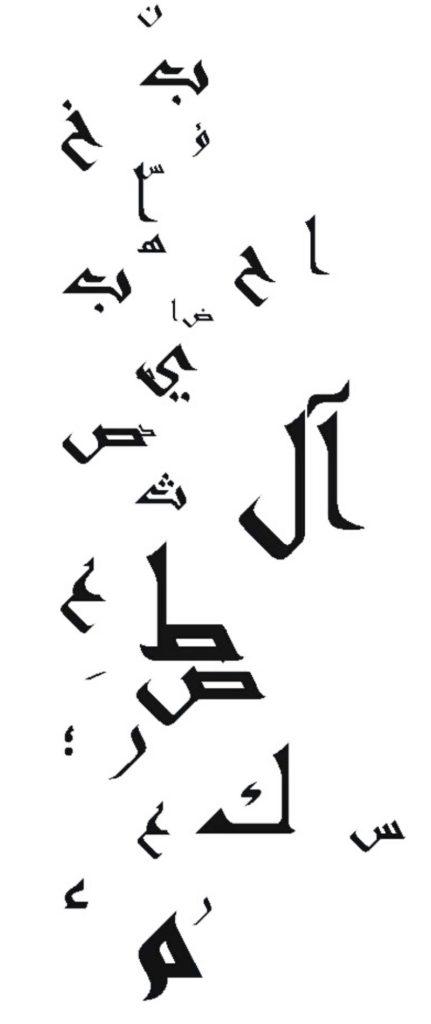
Book Review: Muslim women who taught their husbands
By Rahla Khan
Whenever I’m asked to recommend a good read to someone, I’m often stuck for choices after the classics. There are not many contemporary books that can be read without reservations, and which give one good value for the time invested in reading them.
However, this is one book that I would recommend with equal enthusiasm to Muslim and non-Muslim readers – and most of all to Islamophobes who perpetuate the myth of how ‘Islam subjugates Muslim women’ and keeps them ‘oppressed and ignorant.’
This brief history of six Muslim women scholars from the ‘Dark Ages’ – the period of history notorious for the ignorance, superstition and intellectual debilitation that permeated most of the ‘civilized world’ – is a definitive negation of the aggressive propaganda.
The author, who goes by the pen-name ‘Bint-us-Sabeel’ says in the introduction: ‘’I can almost feel the shock when your eyes fell upon the title: ‘Muslim Women Who Taught Their Husbands’! This shock most probably stems from the sad state of affairs many Muslims find themselves in today.
“Muslim women today may not teach their husbands because:
-
- They don’t have that sort of knowledge to teach their husbands, full stop.
- The husband does not want to learn from his wife (“how embarrassing my wife teaching me!”)
- One or both parties are just too busy to take time out to sit together and learn the Deen of Allah.
- One or both parties have no or little interest in studying Islam.
“Yet the Muslims of yesterday were very different from the Muslims of today… the scholars of the past were such that they would travel for months in pursuit of just one Hadith of the Prophet ﷺ. For such men, having a scholar as a wife was one of the greatest blessings in this world and a source of respect and honor.”
The Story of Fatimah Bint Al-Mundhir
The very first scholar mentioned in the book, Fatimah Bint al-Mundhir Bin az-Zubayr Bin al-‘Awwam, granddaughter of Asma Bint Abi Bakr, illustrates this point.
A prominent Ta’biyah (from the generation succeeding the Prophet’s Companions) and jurist, she was married to her cousin, Hisham Bin ‘Urwah Bin az-Zubayr. Interestingly, Fatimah learnt more from Asma Bint Abi Bakr than her cousin, and so, he would memorize narrations from his wife, before passing them on to his students who included scholars like Imam Abu Hanifah, Imam Malik, Shu’bah and Sufyan Ath-Thawri. Thus, there is a whole line of scholars who learnt ahadith which are included in Sahih Al-Bukhari and Sahih Muslim on her authority, led by her own husband.
The author writes at the end of Fatimah’s story: “For some of the leading scholars of Islam to record these ahadith where women have narrated the Hadith and a man has narrated from his wife, holds great lessons for those who claim that the scholars of Islam were misogynists and androcentric.”
More Stories of Female Islamic Scholars
One noteworthy feature of the lives of these women scholars is the lack of domestic strife and “ego problems” between them and their spouses – although some of them were more knowledgeable than their husbands and even corrected them on occasion.
Among other delightful vignettes, the book mentions how the Mahr for one of the women scholars was a book of commentary!
The story goes that the scholar Muhammad Bin Ahmad Bin Abu Ahmad ‘Ala-ad-Din As-Samarqandi, author of ‘Tuhfat Al-Fuqaha’, had a daughter named Fatimah, who was so knowledgeable that she would issue fatwas (religious edicts and verdicts) along with her father. One of her father’s students, ‘Alaa ad-Din Abu Bakr bin Mas’ud al-Kasaani wrote a commentary on ‘Tuhfat Al-Fuqaha’ called ‘Bada’i` Al-Sana’i`’, which made such an impression on the Sheikh that he accepted the book as dowry for his daughter – when he had earlier refused a proposal for her from the kings!
One noteworthy feature of the lives of these women scholars is the lack of domestic strife and “ego problems” between them and their spouses – although some of them were more knowledgeable than their husbands and even corrected them on occasion.
Maryam Bint Jahsh, a scholar of classical Arabic helped her husband, the Yemeni scholar Jamal ad-Deen ‘Ali Bin Abee’l-Fawaris al-Hamdani resolve a debate with members of the Murji’ sect; while al-Mutahhar Bin Muhammad who was married to the famous Mujtahidah Fatimah Bint Yahya used to consult her on juristic matters while she sat behind a curtain, such that when he came up with the answer, his students would say: “This is not from you. This is from behind the curtain!”
The book concludes with an account of Amat al-Ghafoor Bint Ishaaq ad-Dihlawi, a muhaddithah from Delhi, India, who helped her husband so that “whenever he faced any difficulty in Hadith or Fiqh, he benefited from her.”
The husband of Sa’eed ibn al-Musayyib’s daughter, who brought “the knowledge of Sa’eed” to her husband and taught him right from the first day of her marriage, famously praised his wife:
“She was among the most beautiful people, and most expert of those who know the Book of Allah by heart, and most knowledgeable of the Sunnah of the Prophet (peace be upon him) and most aware of the right of the husband.”
What is it that stops us from raising women like these, who will be assets to their families and communities and continue to benefit the cause of Islam for centuries?
The book can be downloaded from our bookstore.
SCIENCE
QUR’ANIC MIRACLE:
Scientific discovery of a city buried in Rub al-Khali (Empty Quarter)
By Faraz Omar
SAND and only sand for thousands of kilometers extending over four nations, Rub al-Khali or the Empty Quarter is the world’s largest sand desert covering parts of Saudi Arabia, the UAE, Oman and Yemen. Uninhabited one may think but the Bedu tribes have survived on the edge since before recorded time.
Sand dunes reach as high as 250 meters, while billions of glittering stars light up its night sky – a feat hikers and campers don’t like to miss. Formidable conditions – extremely high temperature and dry as a bone – have kept travelers and settlers far away.
To say this place was once luscious green, with lakes and ponds and springs, chirping birds, grazing deer, sleeping water buffaloes, and of course humans would be an unbelievable myth. Yet it’s all true – facts are stranger than fiction.
According to myth, Ubar was a sumptuously rich city, grown fat from the frankincense trade. Said to have been destroyed as punishment for its inhabitants’ impiety, the city remained elusive for centuries. – National Geographic
Much has been written about this Quarter. Archeologists and geologists have found remains of thousands of lakes (in two periods: between 37,000 and 17,000 years ago and between 10,000 and 5,000 years ago), fossils of cattle and hippos, and of flint tools including knives, scrapers, borers and arrowheads. The mission, the hard work, and the use of technology by scientists to uncover details have all been documented in chronology.
This piece is about the people who inhabited a part of the area. Who were they and what happened to them?
The People Who Once Lived Here
National Geographic reports:
“In 1932 Bertram Thomas recorded Bedouin tales of a fabled trading city that disappeared beneath the sands of the Empty Quarter, beginning a love affair between Western explorers and the ancient city of Ubar. According to myth, Ubar was a sumptuously rich city, grown fat from the frankincense trade. Said to have been destroyed as punishment for its inhabitants’ impiety, the city remained elusive for centuries.” [1]
How much of a myth were these stories?
“Did you not see how your Lord dealt with Aad? Iram (the city) of the pillars, the like of which were not created in the land?” (Qur’an, 89:6-8)
The people of Aad lived in an area between Yemen and Oman.[2] Iram “refers to the House of the kingdom of Aad” as mentioned by early scholars like Qatadah and As-Suddi. [3]
The Qur’an additionally speaks “of the pillars” because they lived in trellised houses that were raised with firm pillars. [4]
“Do you build high palaces on every high place, while you do not live in them? And do you get for yourselves palaces (fine buildings) as if you will live therein forever?” (Qur’an, 26:128-129)
The National Geographic article continues:
“It wasn’t until 1992, after decades of fruitless exploration, that scientists finally made headway. Using space-based radar imagery, they detected ancient caravan tracks that converged near modern-day Shisr in southwest Oman. Their excavations uncovered a large octagonal fortress with thick walls standing ten feet (three meters) high, along with eight towers at its corners. Greek, Roman, and Syrian pottery shards discovered in the ruins – the oldest dating from 4,000 years ago – suggested the site was indeed an important trading center. The fact that the city seemed to have met with a rather cataclysmic end – much of it fell into a sinkhole created by the collapse of an underground limestone cavern – was compelling evidence to suggest that this was indeed the fabled city of Ubar.” [5]
Subhan Allah, the evidence even points to the punishment that befell the people. How accurate is the Qur’an! And why not when it is the Lord of the Worlds who is informing us about the people of the past.
The Exact Word ‘Iram’ Found in Excavations
Researchers found in the library of Ebla a record of all of the cities with which Ebla had business ties. On the list was the specific name of the city of “Iram.”
More evidence of Iram is found in the December 1978 edition of National Geographic magazine. In 1973, the city of Ebla was excavated in Syria. The city was discovered to be 4,300 years old. Researchers found in the library of Ebla a record of all of the cities with which Ebla had business ties. On the list was the specific name of the city of “Iram.” The people of Ebla had apparently conducted business with the people of “Iram.”
These fascinating details hint at yet another (among the infinite) proof of the divinity of the Qur’an. Presenting such precise details of a people who lived thousands of years before the advent of Prophet Muhammad (peace be upon him) is humanly impossible during a time of little scientific advancement.
Leaving aside these intriguing details, let’s come back to our original question: Who were these people? We must know that the Qur’an is not a book of history or science. It does have many signs for people to believe in it – historic, scientific, literary, etc. – but its primary purpose is to guide humanity.
The People of Aad
The story of Aad is one for our guidance. Aad were the strongest people of their time in their physical stature, and were the mightiest in power. But they were rebellious, arrogant, and disobedient tyrants. They worshiped false gods besides Allah. They abused the blessings and power they had, and they spread corruption on earth.
“As for Aad, they were arrogant in the land without right, and they said: “Who is mightier than us in strength?” See they not that Allah Who created them was mightier in strength than them. And they used to deny Our verses!” (Qur’an, 41:15)
As with every disbelieving nation in the past, Allah first sent a prophet to the people to remind them and call them back towards righteousness.
Aad denied the Messengers. When their brother Hud said to them:
“Will you not fear Allah and obey Him? Verily, I am a trustworthy Messenger to you. So fear Allah, keep your duty to Him, and obey me. No reward do I ask of you for it; my reward is only from the Lord of the Universe.
“Do you build high palaces on every high place, while you do not live in them? And do you get for yourselves palaces (fine buildings) as if you will live therein forever? “And when you seize (somebody), seize you (him) as tyrants?
“So fear Allah, keep your duty to Him, and obey me. And keep your duty to Him, fear Him Who has aided you with all (good things) that you know. He has aided you with cattle and children. And gardens and springs. Verily, I fear for you the torment of a Great Day.”
They said: “It is the same to us whether you preach or be not of those who preach. This is no other than the false tales and religion of the ancients. And we are not going to be punished.” So they denied him, and We destroyed them. Verily, in this is indeed a sign, yet most of them are not believers. (Qur’an, 26:123-139)
How were they destroyed?
And as for Aad, – they were destroyed by a furious violent wind which Allah imposed on them for seven nights and eight days in succession, so that you could see men lying overthrown (destroyed), as if they were hollow trunks of date palms! Do you see any remnants of them? (Qur’an, 69:6-8)
For seven nights and eight days continuously they were battered with a cold, violent wind. Was it a massive cyclone or a turbulent wind carrying tons of sand? We don’t know. Its magnitude and nature may not be known to us, but we know it was severe and it rooted out these people. Only Prophet Hud and the believers were saved. They migrated to Hadramout in Yemen and settled there.
Remarkable Fact About Their Remains
The last verse is quite interesting: “Do you see any remnants of them?” Which means, as Ibn Kathir said, “Do you find any one of them left or anyone who even attributes himself to being from them?” This is the obvious meaning.
However, there’s one remarkable fact. Retired Aramco geologist Hal McClure, who in his 1984 doctoral thesis at London University reported in detail on the lakes, says there are no fossil remains of humans there. “Absolutely none” have been found at the lake, he said, though explorers have found flint tools, including knives, scrapers, borers and arrowheads.[6]
“Do you see any remnants of them?” The verse is absolutely right even if there were fossils because there are no people of Aad living today. But could it also mean they were destroyed without a trace left behind?
So if you happen to visit the Empty Quarter, enjoying the calm desert and the glittering night sky, let’s remember how it was once a trading center, with gardens and gushing springs, inhabited by a powerful and rich civilization, but who made life hell on earth and rebelled against God.
Let’s remember how an entire city lies buried beneath the sand we’re camping upon.
[1] National Geographic Magazine
[2] Ibn Kathir, Stories of the Qur’an
[3] Tafsir Ibn Kathir (abridged), English translation, vol. 10, p. 472, Darussalam
[4] Ibid., p. 471
[5] Op. Cit.
[6] Arthur Clark, Lakes of Rub al-Khali, pp. 28-33 of the May/June 1989 print edition of Saudi Aramco World.
FOOD & CULTURE
‘What’s the point in planting olive trees?’
STORIES MY FATHER TOLD ME
Visiting Jiddu (grandpa) and Teta (grandma) in their mountain village was always a treat. Teta would have special sweets and my favorite food prepared for me. Best of all though was Jiddu taking me with him to the fields. Sometimes it was a brief trip to see how the plants were growing. But sometimes Jiddu would ask me to be “Jiddu’s helper” and assist with the small chores. During one visit, Jiddu told me that we would be planting olive trees. Because we would be staying in the olive fields all day, we had to bring with us a zuwaidy [picnic lunch], water and other provisions.
The next morning, Jiddu and I set out for the fields much earlier than usual, with a donkey carrying our provisions and small olive plants. We worked hard planting the young olive trees in furrows Jiddu had dug earlier. My job was to hold the plant straight while Jiddu would dig a small hole in the ground for each plant. Then I ladled some water from the water drum on each new olive tree.
During our break for lunch, I told Jiddu that next year I would return to help him harvest the olive crop. He smiled and said that would be difficult because olive trees take many, many years before they bear fruit. Disappointed, I asked him why we were bothering to plant olive trees if we would be dead before they would give us any fruit. He looked at me with a serious expression and said, “Zara’u fa akalna, nazra’u fa ya’kulun.” (“They planted so we would eat; we plant so our descendants will eat.”)
— Artist Helen Zughaib was born in Beirut. Her full original series “Stories My Father Told Me” has been featured in several exhibitions. Excerpted from the Saudi Aramco World
Cooking with the Caliphs:
Food from 9th century Baghdad
A little over a thousand years ago, an Arab scribe wrote a book he titled Kitab al-Tabikh (The Book of Recipes). It was a collection of recipes from the court of ninth-century Baghdad, for the scribe’s unnamed patron—probably Saif ad-Dawlah al-Hamdani, the culture-minded prince of 10th-century Aleppo—had specifically asked him for the recipes of “kings and caliphs and lords and leaders.” The scribe, Abu Muhammad al-Muzaffar ibn Sayyar, was in a position to oblige, being descended from the old Muslim aristocracy himself.

The book has come down to our time in three manuscripts and fragments of a fourth—and what a treasure it is. These are the dishes actually eaten by the connoisseurs of Baghdad when it was the richest city in the world. There are recipes from the personal collections of every caliph from al-Mahdi (died 785) to al-Mutawakkil (died 861), including 20 from Harun ar-Rashid’s son al-Ma’mun. Thirty-five of the recipes—nearly one-tenth of the non-medicinal dishes in the book—come from Harun’s brother, the famous poet and gourmet Ibrahim ibn al-Mahdi.
This was the golden age of medieval cookery; centuries later, cookbooks would still carry recipes named for these very men: haaruuniyyah, ma‘muuniyyah, mutawakkiliyyah, ibraahimiyyah. A dish named for Ma’mun’s wife, buraniyyah, lives on today.
But Kitab al-Tabikh includes scarcely any of the familiar dishes of the modern Arab world. There’s no hummus or tabouli, no stuffed grape leaves, no kibbe, no baklava. Many dishes have strange, clanking medieval names like bazmaawurd, kardanaaj, isfiidhabaaj and diikbariika.
It was a heavily Persianized cuisine, but the dishes are not those of modern Iran either. There isn’t a single pilaf recipe, for example. What we see in this book is the royal cuisine of sixth- and seventh-century Iran along with a wealth of new dishes created under its influence by the chefs of Baghdad.
When the Arabs conquered Persia, they found a sophisticated court with a rich and impressive cuisine, and they eagerly adopted Persian eating habits.
This was inevitable. Pre-Islamic Arabia had a wholesome but monotonous diet that revolved around dates, barley and dairy products. There were separate Arabic words for fresh dates mixed with milk (majii’), dried dates steeped in milk (siq‘al), pitted dates kneaded with milk (watii’ah) and pounded dates moistened with milk (wajii‘ah). When the Arabs conquered Persia, they found a sophisticated court with a rich and impressive cuisine, and they eagerly adopted Persian eating habits.
Kitab al-Tabikh contains anecdotes about cooking contests organized by the Persian kings. We know that the Abbasid caliphs later did the same. And “The Story of King Khusraw and His Page” was eventually translated into Arabic with many details intact, such as the fattening of chickens on hemp seed.
The centerpiece of ninth-century Baghdadi cuisine was rich and complex stews, often cooked in the tannuur (tandoor oven). Some had Persian names, such as sikbaaj (which was flavored with vinegar) and naarbaaj (flavored with pomegranate juice). The dishes with Arabic names, presumably developed in Baghdad, were often named after the main ingredient; for example, ‘adasiyyah (lentils with meat) and shaljamiyyah (with turnips). Some were named for aristocrats, such as haaruuniyyah (containing ground sumac, clearly one Harun ar-Rashid’s favorite spices, because it appears in several of his recipes in Kitab al-Tabikh). A few stews have fantasy names. Narjisiyyah was topped with an egg, giving it the appearance of a narcissus flower—at least, if you really yearned to see the resemblance.
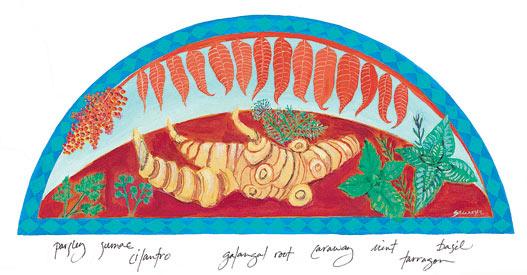
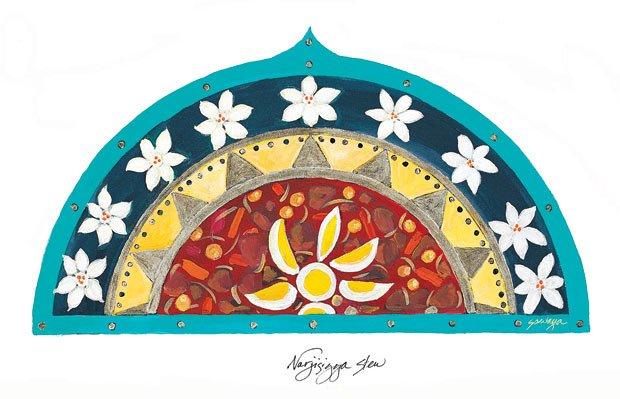
The dishes in this book call for a wide range of spices, including some little used in many Arab countries today, such as caraway (highly popular in the ninth century), the garlic-like asafetida, and galangal, a root which tastes like a cross between ginger and mustard. Fair enough: Everybody knows medieval food was heavily spiced. What’s more surprising is the lavish use of herbs in these recipes—sometimes five or more herbs in a single dish, including basil and tarragon as well as the usual mint, parsley and cilantro of modern Arab cookery. Many stews are sprinkled with the bitter, plum-scented herb rue just before serving. Even more surprising, many medieval stews call for cheese to be thrown in at some point.
The most unexpected flavoring is murri. This was made by wrapping lumps of barley dough in fig leaves so that they would be attacked by mold, then mixing the moldy barley with flour, salt and water and allowing it to ferment for another month or more. The rotted barley paste would then be pressed to yield a dark-brown liquid which turns out to taste just like soy sauce. This whiff of soy ran through the food of the caliphs. The Arab sauce was not borrowed from China, however: Murri was never made from beans and it was always a liquid sauce, while the Chinese product was used as a paste until the 16th century.
It comes as a surprise that eggplant shows up so rarely in these recipes. In today’s Arab world, it is sayyid al-khudaar, the lord of vegetables, but at the time it was a recent import from India and not yet quite popular. It was considered impossibly bitter; in a widely repeated anecdote, a Bedouin declared that eggplant had “the color of a scorpion’s belly and the taste of a scorpion’s sting.” It was actually considered bad for the health. Doctors blamed it for everything from freckles and a hoarse throat to cancer and madness.
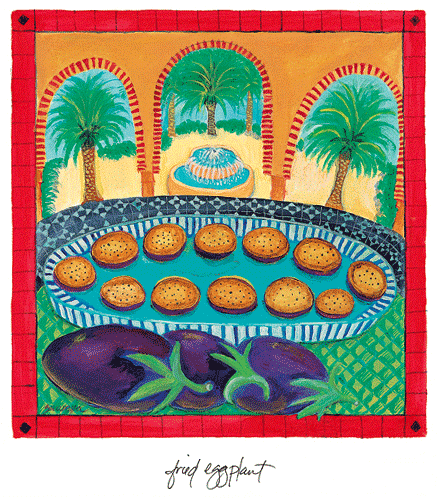
Still, there are seven eggplant baaridah in this book, probably because a taste for eggplant first arose among the aristocracy. Two of the dishes are called baadhinjaan buran, “the eggplant of Buran,” after al-Ma’mun’s wife, whose month-long wedding party was a medieval byword for luxury. Today a vast range of dishes called burani or buraniyyah are made everywhere from Spain to India. The recipes in Kitab al-Tabikh, dating from only 50 or 60 years after her death, must be very close to the originals. One is simply fried eggplant slices sprinkled with murri, pepper and caraway. It’s rather good.
RECIPE:
Mulahwajah of Caliph Harun ar-Rashid
Mulahwajah means “hasty.” The book says that this recipe was often prepared for Harun ar-Rashid. Galangal is sold in Arabia as ‘irq al-hail or khulanjan, and in Southeast Asian markets under such names as kha and laos. Dried ginger could be substituted. Use the rue sparingly—it’s very bitter.
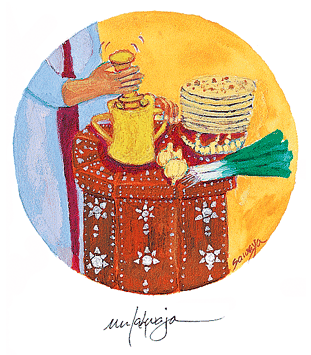
Ingredients:
2 tablespoons oil
1 onion
2 leeks
rue, preferably fresh
cilantro (green coriander, kuzbarah)
½ pound lamb, chopped or ground
2 teaspoons ground coriander seed
½ teaspoon cinnamon
1 teaspoon ground caraway
1 teaspoon ground pepper
1 teaspoon ground galangal
4 teaspoons vinegar
2 tablespoons soy sauce (substitute for murri)
2 tablespoons honey
Preparation:
Heat oil in pan. Add onion, leeks, pinch of rue and 2 to 3 sprigs cilantro and fry until soft. Add meat and fry until brown. Add coriander, caraway, pepper, galangal, vinegar and soy sauce. Cook until done. Stir in honey and garnish with several more sprigs cilantro. Serve with flatbread. Serves two.
Excerpt from an article written by Charles Perry for the Saudi Aramco World. Charles, a former food writer for The Los Angeles Times, has written widely on food history and published a translation of al-Baghdadi’s 13th-century cookbook (A Baghdad Cookery Book, Prospect Books, 2005).
ISLAMIC FINANCE
The importance of working and earning a livelihood in Islam
By Imam al-Ghazali (d. 505H/1111CE)
The following is an excerpt from Imam al-Ghazali’s book, Kitāb Ādāb al-Kasb wal-Maʿāsh (The Book on the Morals of Earning and Living), translated by Prof. Adi Setia, and slightly edited for publishing on Muslim Ink. It lists the virtues of working and halal earning in the Islamic tradition.
Virtues mentioned in the Qur’an
Allah mentions in the Qur’an, “And We have made the day for livelihood” (Qur’an, 78:11). He mentioned this ayah in the context of exhibiting His blessings [on humankind]. In another ayah, “And We have established you on earth and provided you a means of livelihood thereon. Little are you grateful” (Qur’an, 7:10).
Thus Allah has made livelihood a blessing and demanded gratitude for it.
Allah says, “It is no crime for you to seek bounty from your Lord” (Qur’an, 2:198), “…And others traveling the land seeking the bounty of Allah” (Qur’an, 73:20), “Then disperse through the land and seek the bounty of Allah” (Qur’an, 62:10).
Virtues mentioned in the Sunnah
As for what is from the Prophetic reports (al-akhbār), verily the Prophet ﷺ has said, “Of the sins, there are sins for which nothing can atone except vexation in seeking a living.” [At-Ṭabarānī in al-Awsaṭ, Abū Nuʿaym in al-Ḥilya (Itḥāf 6:251)]
The Prophet ﷺ said, “The honest merchant (al-tājir alṣadūq) is resurrected on Judgment Day with the truthful and the martyrs.” [At-Tirmidhī, al-Ḥākim, Ibn Mājah (Itḥāf 6:251)]
He ﷺ also said, “Whosoever seeks the world lawfully in order to refrain from asking, to work for [the provisioning of] his dependents and to show compassion to his neighbor, shall meet Allah with his face like the moon on the night when it is full.” [Abū al-Shaykh in al-Thawāb, Abū Nuʿaym in al-Ḥilya, al-Bayhaqī in Shuʿayb al-īmān (Itḥāf 6:252)]
The Prophet ﷺ was sitting one day with his Companions, and they observed a strong, sturdy youth setting out early to work. They said, “Woe unto this man; would it that his youth and strength were spent in the path of Allah.” The Prophet ﷺ said, “Do not say this; for if he works for himself in order to restrain himself from begging and to be independent of people, then he is in the path of Allah. If he works for his impoverished parents or for his impoverished children so as to enrich and suffice them, then he is in the path of Allah. If [however] he works for the sake of showing off and accumulation [of wealth], then he is in the path of Satan.” [At-Ṭabarānī in his three Maʿājim (Itḥāf 6:252)]
The Prophet ﷺ said, “The honest merchant (al-tājir alṣadūq) is resurrected on Judgment Day with the truthful and the martyrs.” [At Tirmidhi]
He ﷺ said, “Verily, Allah loves the servant who adopts a trade in order to be independent through it of people, and He dislikes a person who learns knowledge in order to adopt it as a trade.” [Al-ʿIrāqī says he did not find the hadith in this wording; however, Abū Manṣūr ad-Daylamī narrates in Musnad al-Firdaws a hadith of ʿAlī that Allah loves to see His servant worn out in seeking the lawful (Itḥāf 6:253)]
In one narration, “Verily, Allah Most High loves the gainfully employed believer[1] (al-muʾmin al-muḥtarif).” [Al-Ṭabarānī and ibn ʿAdī (Itḥāf 6:253)]
The Prophet ﷺ said, “The most lawful of what a person eats is from his own work, and [from] every pious sale (bayʿ mabrūr).” [Aḥmad, al-Bazzār, al-Ḥākim, al-Bayhaqī (Itḥāf 6:253)]
In another report, “The most licit of what the servant eats is [out of] the work of his vocation when he acts in good faith (naṣaḥa).” [Aḥmad (Itḥāf 6:254)]
The Prophet ﷺ said, “Hold fast to commerce (al-tijāra) for indeed it constitutes nine tenths of sustenance (al-rizq).” [Ibrāhīm al-Ḥarbī in Gharīb al-Ḥadīth (Itḥāf 6:254)]
It has been narrated that ʿĪsā (Jesus) (peace be upon him) met a man and he said, “What do you do?” The man said, “I worship.” He said, “Who provides for you?” The man said, “My brother.” He said, “Your brother is more worshipful than you.” [Cited in al-Makkī, Qūt al-Qulūb (Itḥāf 6:255)]
Virtues mentioned by the Sahabah and Salaf-us-Saalih
As for the traditions (al-āthār), Luqmān al-Ḥakīm said to his son, “O my son, seek independence from poverty through lawful earning, for indeed, not a single person becomes impoverished except that he is afflicted by three traits: vulnerability in his religion, weakness in his intelligence, and loss of his dignity. And what is greater than these three is people’s belittling of him.”
ʿUmar [ibn al-Khaṭṭāb] (may Allah be pleased with him) said, “None of you should sit unoccupied with seeking sustenance and say, ‘O my Lord, give me sustenance,’ for you are well aware that the sky does not rain down gold or silver.” [Cited in al-Makkī, Qūt al-Qulūb (Itḥāf 6:257)]
Zayd ibn Maslama[2] used to cultivate his land, and ʿUmar (may Allah be pleased with him) said to him, “You are doing the right thing. Be independent of people for that will be more protective of your religion and more munificent of you in respect of them…”
Ibn Masʿūd (Allah be pleased with him) said, “Indeed I detest seeing a person idling, neither occupied with his worldly nor after worldly concerns.”
Ibrāhīm [al-Nakhaʿī] was asked about the truthful merchant (al-tājir al-ṣadūq) as to whether such a person was more to his liking than one exclusively devoted to worship (al-mutafarrigh lil-ʿibāda). He answered, “The truthful merchant is more to my liking for he is in exertion (jihād). Satan comes to [tempt] him through the avenue of measuring and weighing, and through taking and giving, but [despite all that] he strives against him.” However, al-Ḥasan al-Baṣrī differs with him on that issue.
ʿUmar [ibn al-Khaṭṭāb] (Allah be pleased with him) said, “There is not a place through which death enters that is more beloved to me than an abode (mawṭin) in which I ply my trade in the market (atasawwuq), buying and selling for the sake of my family.”
Al-Haytham[3] said, “It may be that I come to know of a person speaking bad about me (yaqaʿu fiyya), but then I recall my independence of him and thus it becomes light on me.”
Ayyūb[4] said, “A work in which there is some [small] gain is more to my liking than asking of people.”
A violent gale occurred at sea and the people on the ship said to Ibrāhīm ibn Adham (Allah have mercy on him) who was with them on the ship, “Do you not reckon this to be hardship?” He said, “This is not hardship (al-shidda). Verily hardship is to be in need of people.”
Ayyūb said, “Abū Qilāba[5] said to me, ‘Frequent the market, for independence is part of wellbeing (al-ghinā min al-ʿāfiya).’”
[1] One who has acquired a skill, trade, or profession and is practicing it.
[2] Following Qūt al-Qulūb, al-Zabīdī says that this person was actually Muḥammad ibn Maslama ibn Salama al-Anṣārī, a famous Companion who died after 40H (Itḥāf 6:258).
[3] Ibn Jamīl al-Baghdādī of Antioch, a trustworthy scholar of hadith (Itḥāf 6:259).
[4] Ibn Tamīma al-Sakhtiyānī al-Baṣrī (Itḥāf 6:259)
[5] ʿAbdullāh ibn Zayd ibn ʿAmr al-Jaramī al-Baṣrī (Itḥāf 6:259)
INCREASE YOUR KNOWLEDGE

IsDB approves financing of $509m projects in Uzbekistan
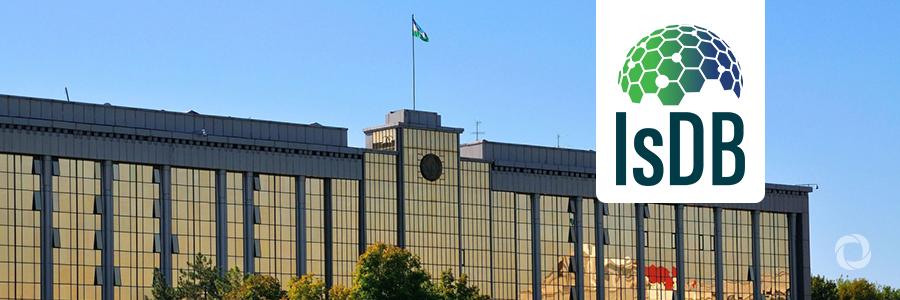
The Islamic Development Bank (IsDB) approved the financing of two large and economically significant projects in Uzbekistan totaling $509.2 million on Dec 19, 2020.
The first $200 million project envisages the modernization of a number of infrastructure and social facilities in the Republic of Karakalpakstan, as well as in Khorezm, Bukhara and Navoi regions. The second project, funded by the Bank of $80 million, will implement the second phase of the program to comprehensively improve the system of medical care for cancer patients by equipping local clinics with modern medical equipment.
Saudi Aramco finds new oil and gas fields
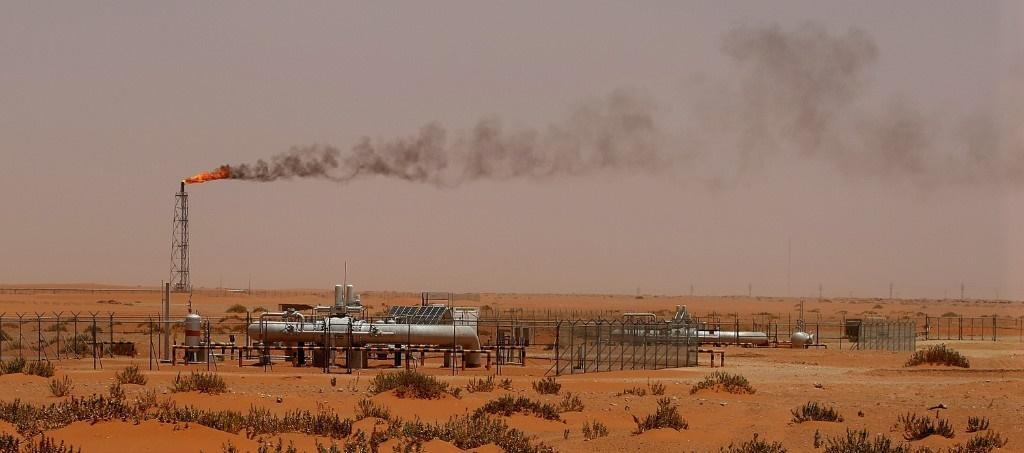
Saudi Aramco, the government-owned petroleum and natural gas company, recently announced that it has discovered new oil and gas fields in different locations around Saudi Arabia.
The nation’s Energy Minister Prince Abdul Aziz bin Salman Al-Saud stated that there is a new well No. 2 located in the Al-Reesh oil field northwest of Dhahran.
“The discovery at Al-Reesh field is especially important as it shows that it is possible to produce Arab extra light crude oil at the Tuwaiq mountain formation,” the minister said, according to the Saudi Press Agency.
That discovery is welcome news for the country that heavily relies on its gas and oil industry that accounts for almost 50% of its gross domestic product, and almost 70% of its export earnings.
The Well No. 2 produces 4,452 barrels of Arab extra light crude oil and around 3.2 million standard cubic feet of natural gas daily. Saudi Aramco also drilled two other wells in the Al-Reesh oil field.
Well No. 3 is reported to have an initial production of 2,745 barrels of extra-light crude oil and an additional 3 million standard cubic feet of gas per day. Well No. 4 produces 3,654 barrels of extra-light crude oil together with 1.6 million standard cubic feet of natural gas daily.
That discovery is welcome news for the country that heavily relies on its gas and oil industry.
Notably, oil was discovered in Al-Ajramiyah well No. 1 that is found in the northwest of Rafhaa city. That well produces 3,850 barrels of oil per day. Furthermore, some non-conventional gas was found in the Al-Minahhaz well which is located to the southwest of the Ghawar oil field.
The well produces around 8 million standard cubic feet of gas and up to 98 barrels of condensate per day. Saudi Aramco also discovered gas in the Al-Sahbaa well that is found to the south of Ghawar. It produces up to 32 million standard cubic feet of gas daily.
Fintech institutions stress on waqf awareness in Indonesia
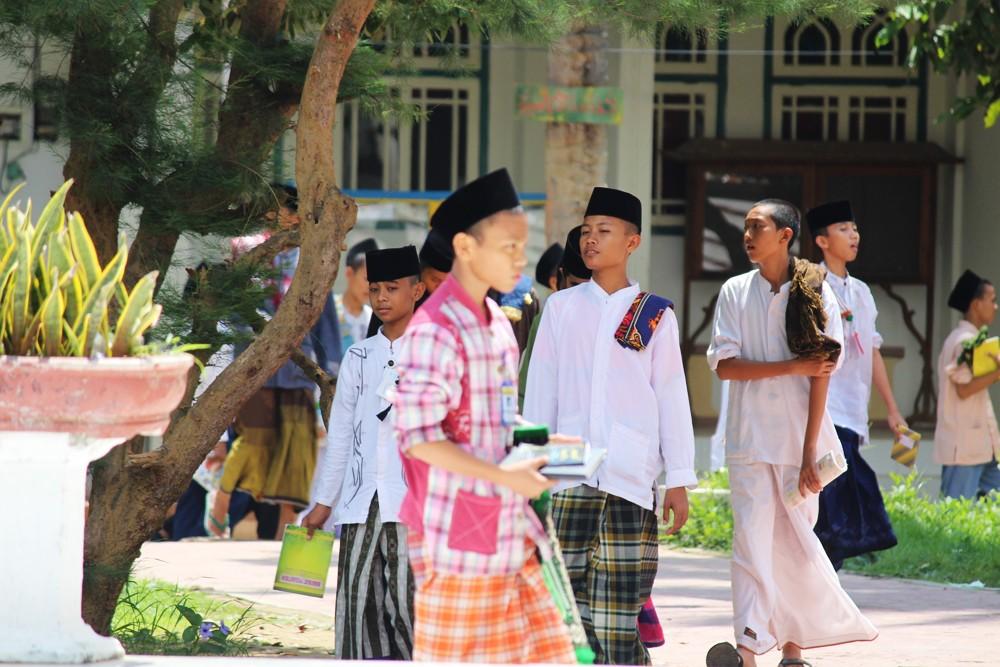
A recent survey by the Indonesia Waqf Board (BWI) showed that Indonesians only scored 50.4 on waqf (religious endowment) literacy, with the board’s vice chairman, Imam Saptono, saying the lack of understanding resulted in unexplored waqf products.
“This is a problem that we need to solve, which is why we have been trying to increase waqf awareness in schools,” he said during a webinar hosted by the Indonesian Fintech Association (Aftech) as part of Fintech Week recently.
Indonesia has the largest Muslim population in the world and according to an estimate by the Boston Consulting Group (BCG), the country has 64.5 million middle-class Muslims in Indonesia in 2020. This presents a huge opportunity for shariah finance.
“…most Indonesians still preferred to channel their waqf to the “triple M”, namely madrasah (Islamic schools), makam (graveyards) and musholla/masjid (prayer rooms or mosques) as they could see the assets.”
However, Indonesia’s shariah financial literacy rate was only 8.93 percent in 2019, Financial Services Authority (OJK) data show. Moreover, the shariah finance market share was less than 10 percent of Indonesia’s overall financial industry in July.
Imam went on to say that people also still lacked the knowledge for productive waqf options because most Indonesians still preferred to channel their waqf to the “triple M”, namely madrasah (Islamic schools), makam (graveyards) and musholla/masjid (prayer rooms or mosques) as they could see the assets.
Once people understand the process and the benefit of productive waqf, such as cash-waqf sukuk, he stated, they may be more welcoming to the idea of giving the endowment through digital platforms.
“For example, users can track their money if we adopt blockchain in cash-based waqf. If we can adopt this technology, it will surely accelerate the national waqf ecosystem,” Imam added.
Similarly, National Alms Agency (Baznas) director M. Arifin Purwakanta noted that the agency and other Islamic financial service providers should educate more people about the ease of shariah transactions through digital platforms.
Having an omnichannel presence has helped Baznas to collect donations from the younger generation, with the agency seeing 24 percent of alms paid through online platforms this year. The new cohort of donors, he added, gave smaller sums of money but donated more often.
PayZakat rolls out smartphone app for charity in Russia
PayZakat users can donate to charitable foundations from different parts of Russia, specializing in helping orphans, treatment and aftercare of seriously ill patients, or educational programs for children from low-income families.

Eight accredited funds are project members as of now. The application allows users to receive spending reports from the charity foundations and calculate the amount of the zakat.
Moving forward, PayZakat is scheduled to be transformed into an information ecosystem for Muslims. Users will be able to share information about donations in social networks, invite friends, and receive charity-related news.
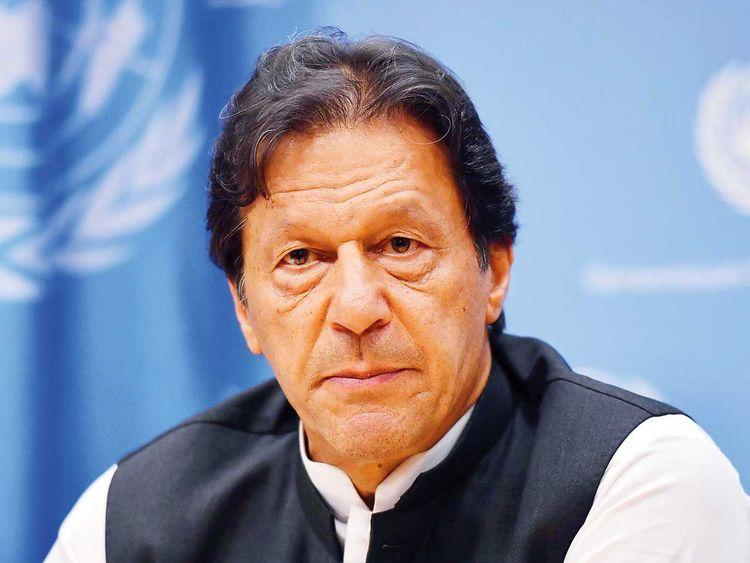
2021 Will Be Year Of Economic Growth: Pakistan PM
ISLAMABAD: Pakistan Prime Minister Imran Khan said recently that the new year will be a year of economic growth for the country. He said the country was already moving in the right direction with essential industries increasing output.
Speaking at an event in Islamabad, the Prime Minister said the construction industry was already on its way up, which he said was evident from rising cement sales in the country, the Dawn reported. “When cement sales are increasing it is a clear sign that construction activity is on the rise,” he said.
Imran said the textile industry was “producing at capacity for the first time in many years” which he said had given rise to a shortage of labour in the sector. The Prime Minister said these signs were indicating that the country was in the right direction and that Pakistan was among nations that had seen the “fastest recovery from the COVID-19 pandemic.”
Videogames are a bigger industry than movies and American sports combined
Videogames have grown to resemble competition-based, interactive movies, and the COVID-19 pandemic has propelled the industry to make more money than movies and North American sports combined.
Global videogame revenue is expected to surge 20% to $179.7 billion in 2020, according to IDC data, making the videogame industry a bigger moneymaker than the global movie and North American sports industries combined. The global film industry reached $100 billion in revenue for the first time in 2019, according to the Motion Picture Association, while PwC estimated North American sports would bring in more than $75 billion in 2020.
Both of those industries suffered from the effects of the COVID-19 pandemic in 2020, however, while the videogame industry is expected to show double-digit growth this year following high-single-digit growth in the previous two years. Experts forecast that strong growth will continue in 2021, following the recent introduction of next-generation gaming consoles from Sony Corp. and Microsoft Corp. and new games to get the most out of those upgrades, even as COVID-19 vaccines are rolled out.
Experts forecast that strong growth will continue in 2021
“I do think there will be a deceleration as soon as effective, cheap, globally available vaccines get out there over the course of 2021, but I’m quite sure at the end of 2021 there will still be billions of potential people that will need vaccines,” Lewis Ward, gaming research director at IDC, told MarketWatch in an interview. “So, my deceleration happens in 2022.”
Limited free articles. Subscribe for full access.

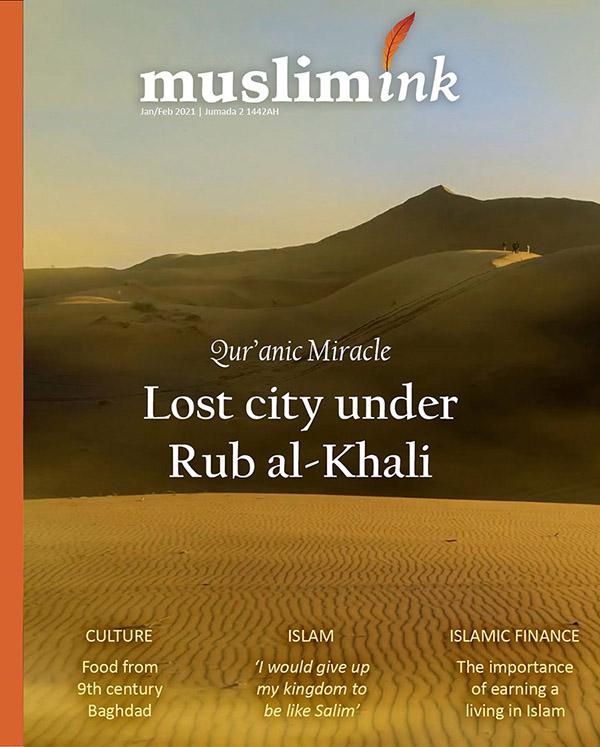
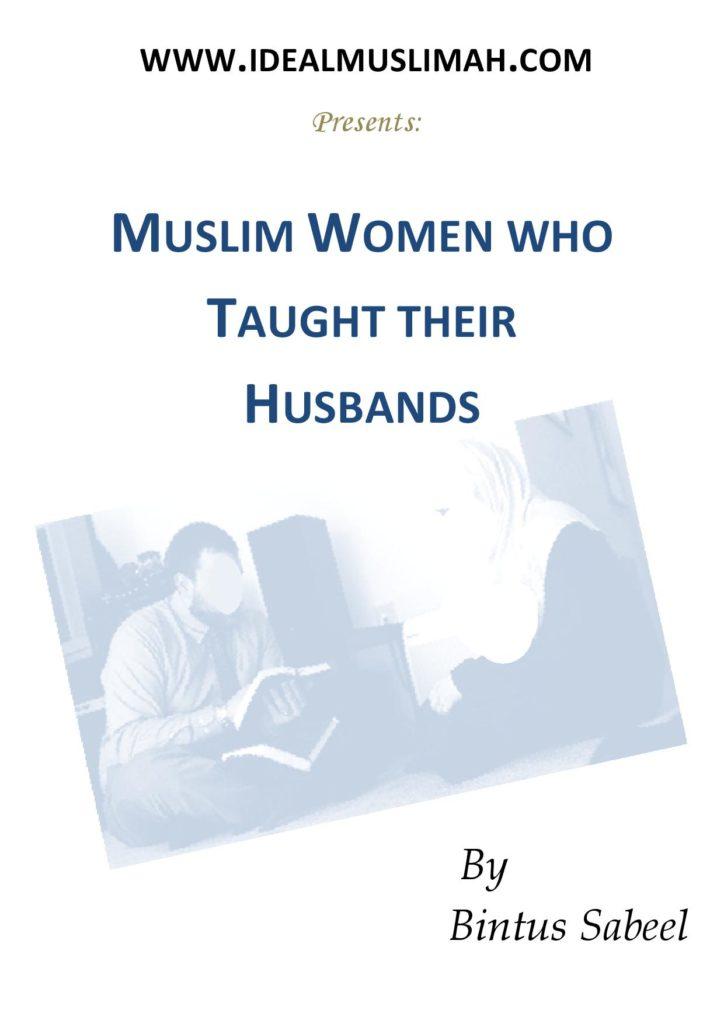
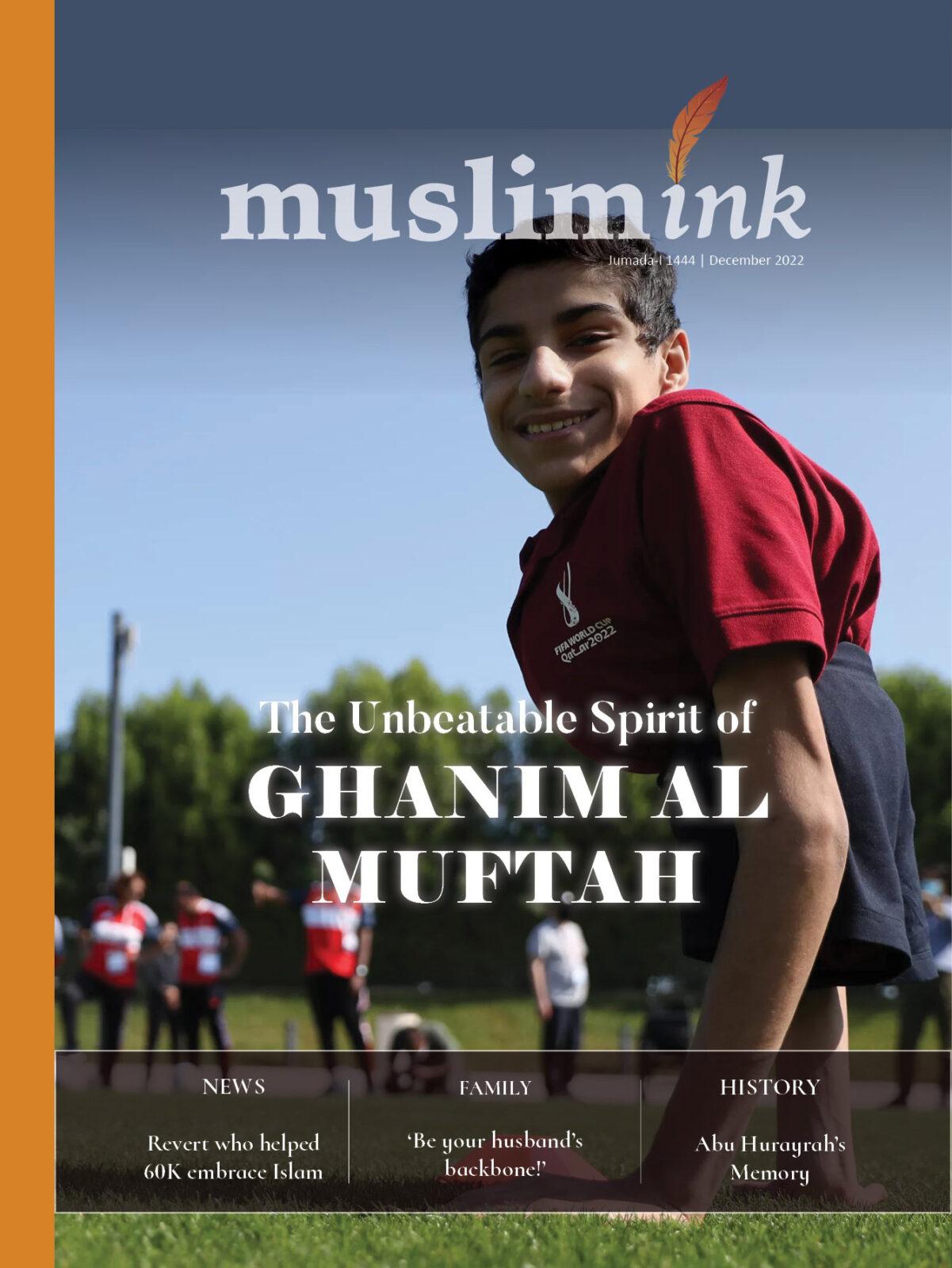
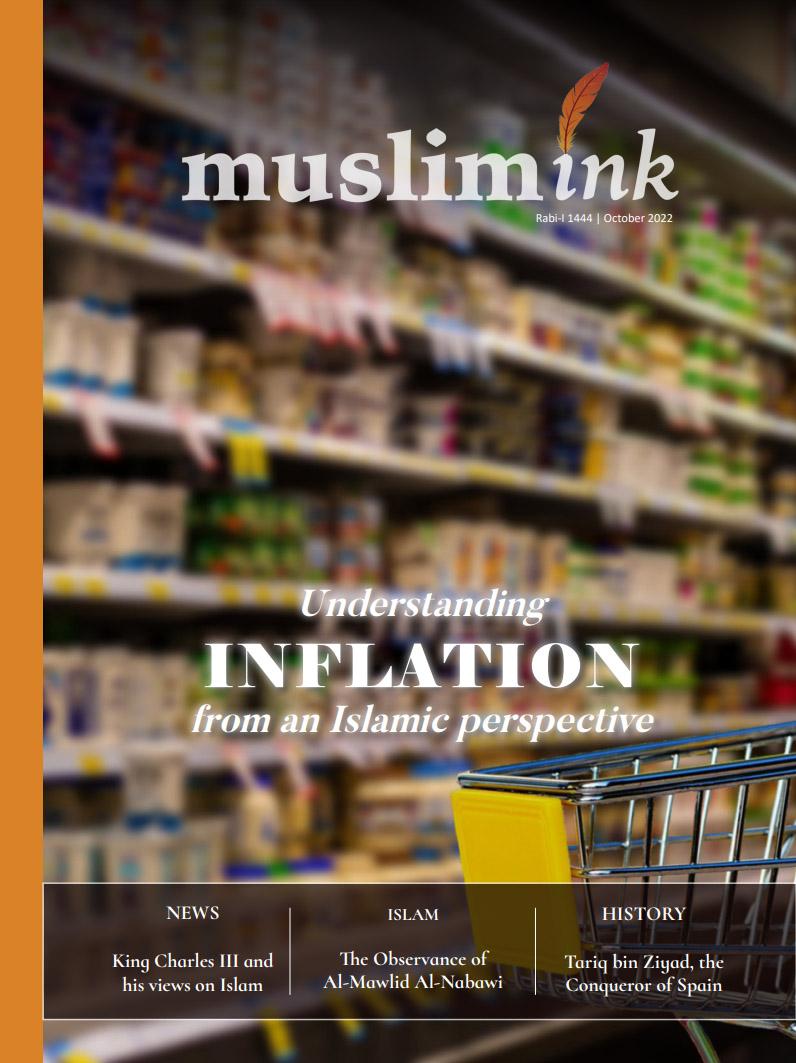
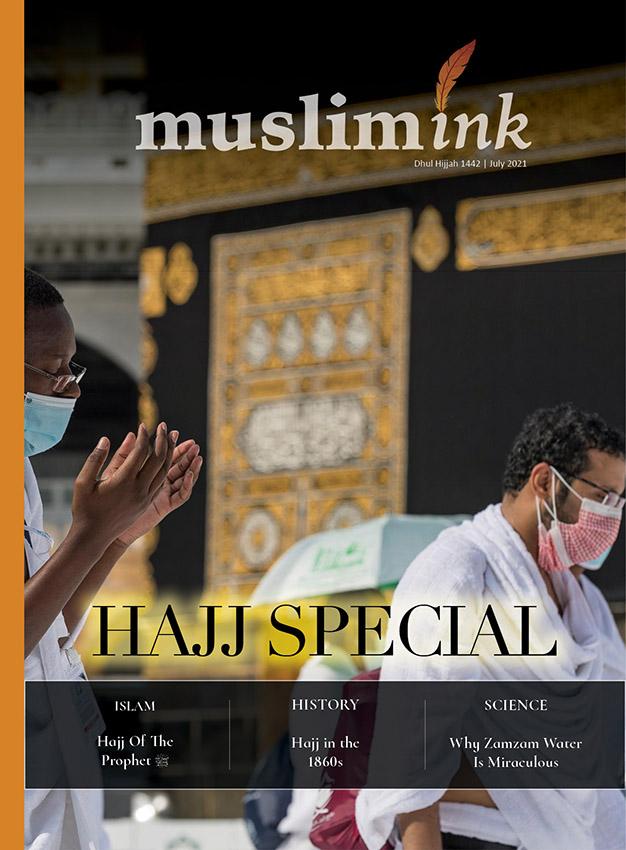
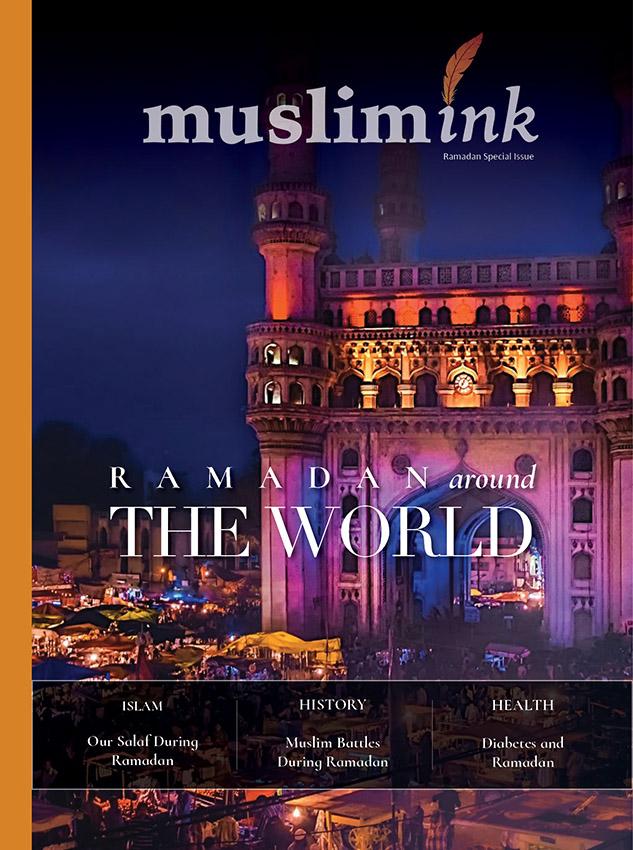
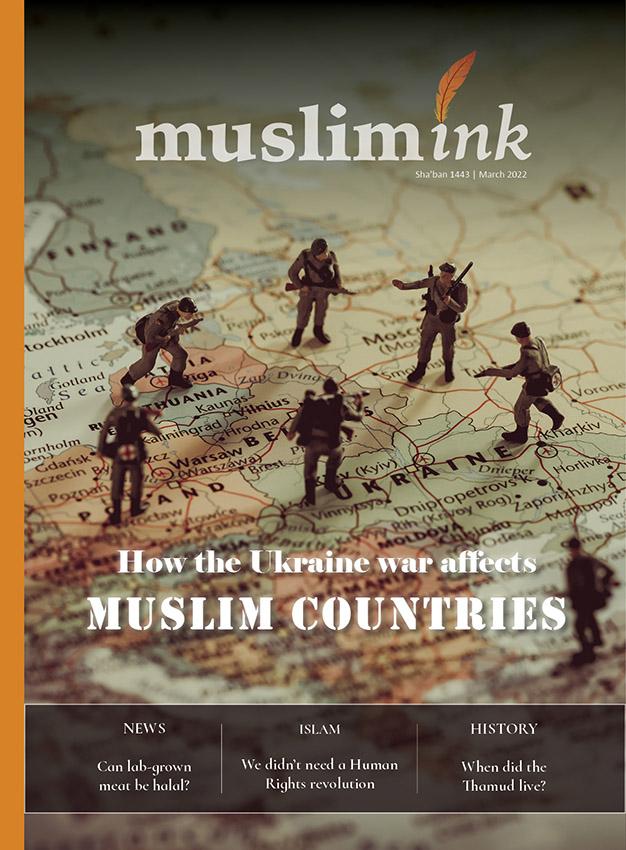

 Dr. Bilal Philips
Dr. Bilal Philips